AHFESL.ORG is the Web site who bring only the truth on Sri-Lanka // AHFESL.ORG est le site web qui ramène que la vérité sur le Sri-Lanka
 |
|
Association Humanitaire Franco Européenne Sri Lankaise |
|
|
|
|
|
|
|
|
|
Click here to translate the page in the language of your choice
Pour afficher Google dans la langue de votre choix
Google recherchera des résultats dans d'autres langues et les traduira pour vous
( Ramener vos Articles et - Cliquez ici )
|
|
Srilanka MIORE Monday 20th.Decembre.2010
Home The News Military probes 5 websites
Military probes 5 websites
Sunday, 19 December 2010 20:01
The military are investigating five websites functioning from overseas over their alleged support for the LTTE Diaspora against the armed forces, ‘Lankadeepa’ reports.
These websites, in Sinhala, Tamil and English languages, posed a threat to national security, it said.
The probe would determine those behind these websites and how they received funding, the newspaper said, adding that then, the military would initiate legal action against them

|
|
Death sentence mandatory on KP and Karuna: any accord is illegal: President, Defense Secretary, AG punishable -legal experts
(Lanka-e-News, 15,Feb.2010, 10.50AM)
No matter what accord or settlement pact is entered into with K P alias Kumaran Pathmanathan the LTTE chief arms supplier and its leader after Prabhakaran’s death, and LTTE arms leader Karuna is unlawful under the Penal code of Sri Lanka, as pinpointed by legal experts of the country.
The five provisions on treason against the State of the criminal procedure code No.15 of 1979, make it very clear that KP and Karuna who had committed treason shall compulsorily be punished with death sentence, and no pact of settlement or accord can be entered into with them.
Hereunder are the provisions..
114)
Warring against or attempting to or aiding and abetting the crime of rebelling against a legally elected Govt. – no warrants necessary for arrests ; unbailable; no settlement pacts or accords allowable.
115 )
Conspiring against a legally elected Govt. – the suspect is liable to a punishment of 20 years in jail and a fine.
116)
Building of arms against a legally elected Govt.- no warrant is necessary to arrest the suspect ; no bail can be granted ; no accord can be reached. He is liable to a 20 year jail sentence and confiscation of property.
117)
Obstructing the legally elected Govt. to fight a war or undermining its strategies by wrongful operations and engagements – a 10 year jail sentence and a fine can be imposed on such a suspect
120)
Inciting hatred and rebellion or attempting to do so against a legally elected Govt.-
The laws therefore very clearly lay down that an accord cannot be entered into with such individuals or granted any relief. The only exception is when that individual is below the age of 16 years or she is pregnant. If the suspect is below 16 years old, the President can keep him in custody for any length of time and his property can be confiscated. If she is a pregnant woman, she can be jailed for life and properties confiscated. In all other cases, death sentence and/ or a jail sentence over ten years not exceeding 20 years together with confiscation of assets and properties can be imposed.
Accordingly, entering into an accord with KP and Karuna are a gross violation of the provisions of the penal code of SL. As they are not below the age of 16 and they cannot claim themselves as pregnant women, they shall compulsorily be liable to death sentence or 20 years imprisonment with confiscation of all assets and properties.
Legal experts and luminaries point out that in the circumstances, by entering into an accord with K P and Karuna is a gross flagrant violation of the basic and fundamental laws. Hence, the President, the defense Secretary and the Attorney General (AG) are liable for punishment.
Moreover,based on the statement made by KP to the newspapers he has confessed to his committing the crimes, which alone is sufficient to institute legal action against him, the experts emphasize.
|
SL stops dual citizenship forthwith :
believed as revengeful action against bitter London tour
(Lanka-e-News -18.Feb.2011 10.25AM)
The immigration and Emigration Dept. has issued a special communiqué barring forthwith the granting of dual citizenship until further notice. Accordingly, all applications forwarded for approval and processing have been immediately stopped. Based on unofficial information , this measure has been taken following the President’s recent unsuccessful London tour when that country allegedly allowed the Sri Lanka (SL) Tamil Diaspora demonstrations which were staged there during the President’s tour. It is learnt that the Defense Secretary Gotabaya Rajapakse had been most determined and responsible for the action in this direction.
A Sri Lankan who has citizenship of another country but has assets in this country could earlier apply for dual citizenship . The Immigration and emigration Dept. gave dual citizenship on the ground that by that there is an economic development for SL society . An individual who is a dual citizen had to pay Rs. two lakhs to the Govt. Those eligible to receive dual citizenship are citizens of Australia , New Zealand, Commonwealth, France , Sweden, Switzerland, Italy, America and Canada.
Some Officials of the Immigration and Emigration Dept. say , the disconcerting element in this is , while the Govt. is avidly inviting affluent foreign citizens to come and invest in this country , is at the same time blocking them by introducing this sudden regulation merely for vindictive reasons.
What is most significant in this perplexing background is both Gotabaya Rajapakse and Basil Rajapakse are enjoying dual citizenships – SL and America.
|
|
Commemorative lecture on second death anniversary of Lasantha Wickrematunge
16 Feb, 2011 Groundviews Colombo, Features, Human Rights, Media and Communications, Peace and Conflict, Politics and Governance, Post-War
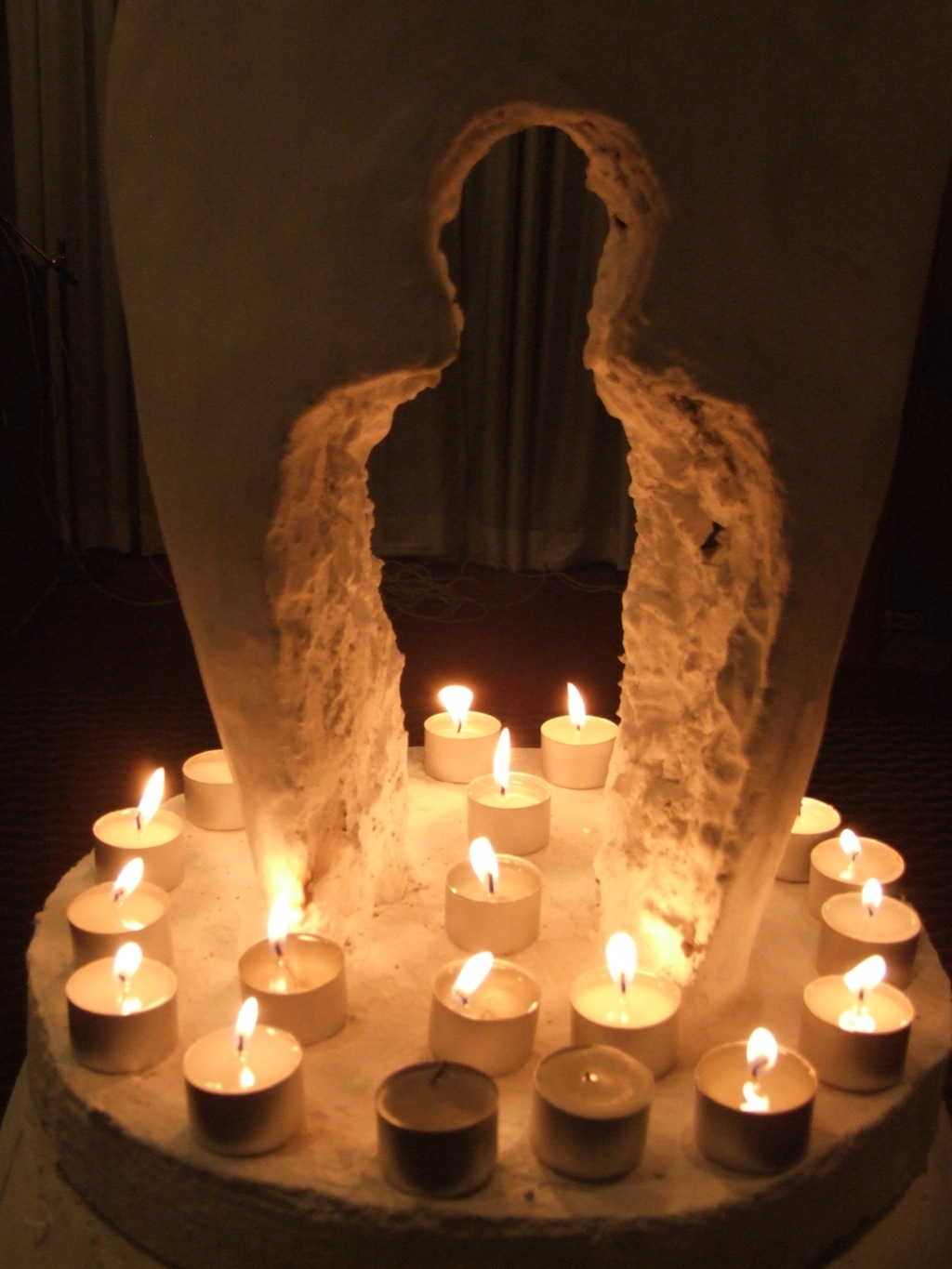
“Our lives begin to end the day we become silent about things that matter” ~ Martin Luther King Jr, (15 January 1929 ~ 4 April 1968), (Activist, Clergyman, and prominent leader in African ~ American Civil rights movement)
A commemorative lecture to mark the second death anniversary of Sunday leader editor Lasantha Wickrematunge was held today. This is the first commemorative lecture to pay tribute to Late Lasantha Wickrematunge, who was killed on 8th of January 2009 in Ratmalana, suburb of Colombo.
Christopher Warren, former President of the International Federation of Journalists (IFJ) delivered the key note address titled ~ “Role of Media in Post-War Democratization”. Candles were lit around the cement monument of pen with a human hollow to pay tribute to the journalists who sacrificed their lives. The monument stands on a barrel painted in white. The monument was created by the Vibhavi Academy of Fine Arts (VAFA).
A large number of human rights activists, diplomats, foreign and local journalists, politicians, artistes and members of the civil society attended today’s commemorative lecture. The event was organized by the Free Media Movement.
Above text and all photos by DushiYanthini Kanagasabapathipillai, a regular contributor to Groundviews.
Speech by Christopher Warren, immediate past President, International Federation of Journalists, and Federal Secretary, Media, Entertainment & Arts Alliance to the Lasantha Wickrematunge commemoration, Colombo, Sri Lanka, February 15, 2011.
These last few weeks have been exhilarating for those of us who believe in democracy, human rights and freedom of speech and the press.
First Tunisia and now Egypt have embarked on the exciting, tumultuous journey to free and democratic societies. There can be no doubt that the most difficult part of that journey is still to come and those countries – and the dominos that will inevitably follow them – will require all the support possible from the international community of friends and supporters of democracy.
And there can be no doubt that there will be stumbles and disappointments along the way. But there can be no doubt that the end result will be a freer, more open – more normal – society.
The events in north Africa are exhilarating not just for their own sake. They are a beacon to the world.
Partly this is due to the significance of Egypt as a central player in Africa and the middle East. It will force every country in the region to confront this question: If Egypt, why not us?
But it is significant beyond its own borders and its own region. It is significant because it marks the renewal of the global march to democracy and human rights.
Over the past decade, this march has stumbled due to two influences. First, the ill-named Global War on Terror came to justify restrictions on human rights in the name of security, to encourage the democratic world to compromise with authoritarian regimes in the name of fighting terror and conflated the spread of democracy with the use of armed force in Iraq and Afghanistan.
These restrictions came although as that great journalist Benjamin Franklin warned us over two centuries ago: “They who can give up essential liberty to obtain a little temporary safety, deserve neither liberty nor safety.”
Yet the sacrifices made in traditional democracies acted not only to set back human rights in those countries. It sent a message to authoritarian regimes around the world that human rights was no longer the central concern that it should be for all democratic nations.
At the same time, the economic growth of China within the strict authoritarian rule of the Communist Party gave new life to the chimera beloved of leaders with authoritarian tendencies everywhere that economic growth occurs best when coupled with strong man rule despite the corruption that goes with it.
Yet we know from within our own region how false that is. All authoritarian regimes sooner or later hit a wall of economic growth that only genuine democracies can break through. We saw it in Korea and Taiwan in 1988 and in Indonesia in 1998. In all those cases, the crisis of authoritarianism could only be resolved through democratization.
And now, the risings in Tunisia and Egypt have again put a full stop to both these lies. They reopen the understanding that you can only fight terror through democracy and only a democracy built on respect for human rights can guarantee a strong and vibrant economy that eliminates corruption.
There’s a further development that makes the examples of Tunisia and Egypt so exciting. They’ve been driven by the same groups that have been working for democracy throughout the world – human rights and press freedom NGOs, independent trade unions and working journalists.
They have not been driven by the traditional political or oppositional groups but from broad based networks reflecting the frustrations of the people.
For me – as I suspect it would have been for Lasantha — the example of journalists is particularly exciting.
We need to be honest – many journalists do well out of authoritarian regimes, particularly in cases like Egypt where so much of the media is state-owned. They get the perks of status and public recognition. They get to pontificate on national television about the inevitability of strong man rule. They get to hobnob with political heavyweights and get invited to drinks with the president. They are relatively well paid. Too many of our colleagues fall into the trap of comfort and compromise.
Yet, as in case after case of democratic revolution around the world, individual working journalists – particularly the rising generation — have rushed to place themselves at the centre of the north African risings.
Even within the state-owned media, journalists have been fighting for – and winning — a free media, for the right to report in the interests of the people, not of the State and the ruling elite. Some have walked out, rather than compromise their journalist principles.
And now we are seeing their battles paying off with the likely break-up and democratization of State-owned media built on the principles of independent public service broadcasting and publishing and the strengthening of independent and private media.
It will be these reforms, more than any others, that will ensure that Egyptian and Tunisian democracy continues to surge forward. And it is these battles that must lie at the heart of the campaigning commitment of journalist communities.
It is clear from this, that there are many lessons to be learnt from north Africa, not least here in Sri Lanka.
As I said, in most of the world, democracy has marked time over the past decade.
Would that were the case here in Sri Lanka. Instead it has gone backwards. And the murder of Sivaram in 2005, of Lasantha Wickrematunge two years ago, the trial of Tissa, Jesiharan and Valamarty, the effective exiling of friends like Poddala, Sanath and Sunanda, and the disappearance of Prageeth Eknaligoda last year all stand as chilling monuments to that deterioration.
Each of these marked a different phase of that deterioration. The murder of Sivaram and the treason trials of Tissa, Jesiharan and Valamarthy all in their own way marked a common goal of both the Government of Sri Lanka and the LTTE – the elimination of any independent, questioning space in the Tamil community.
The bashing of Poddala Jayantha and others and forcing into exile so many other friends marked the attempt to eliminate the sort of independent network of journalists, human rights NGOs and independent unions in the media that, as Egypt and Tunisia shows, can be so challenging to an increasingly authoritarian ruling elite.
And the murder of Lasantha and the subsequent disappearance of Prageeth marked the attempt to eliminate a questioning and challenging media. I doubt there is a journalist in the country that didn’t hear and understand the message that these two events sent.
Lasantha’s powerful message from the grave And Then They Came for Me indicates how well he understood that the attacks on free and independent journalism did not come in a vacuum – they came as part of a concerted push against democracy and human rights.
He also well understood that, in being attacked, he was not being singled out. As he said, he did not travel the journey alone: “Fellow journalists in other branches of the media walked with me: most of them are now dead, imprisoned without trial or exiled in far-off lands.”
And yet, though his murder was only one of many, his standing in our craft meant his killing was more shocking than most. Here was one of this country’s most senior journalists, a fiercely independent editor of one of its leading independent papers, publisher of critical investigative exposes of corruption and wrong doing.
And yet, if his standing could not protect him, how should the rest of the craft stand up?
And yet journalists do. And that’s because, as the actions of many of our colleagues in north Africa have reminded us this year, free and independent journalism can only exist in a free and democratic society built on human rights.
We are like fish who cannot live without the sea of freedom of expression surrounding us.
An independent Sri Lanka is about the same age as the Universal Declaration of Human Rights, so it is no surprise that the challenge of human rights has been intertwined in the history of an independent Sri Lanka from the very beginning.
It has been a history punctuated with human rights abuses from the denial of citizenship to the upcountry Tamils in its very early days through to the murder of Lasantha and the disappearance of Prageeth. It has included some of the world’s most terrible events from the anti-Tamil Colombo pogrom in 1983 to the presentation of suicide bombings as the LTTE’s most enduring gift to the world
Balancing these human rights abuses have been an enduring democracy, flawed and inadequate as it has been at times. A simulacrum of an independent judiciary has survived. Civil society has grown.
What intertwines human rights so deeply in the history of Sri Lanka is not that it has been the worst of societies, any more than it has been the best. It is that from the very beginning of the country’s independence, human rights have always been the central contested terrain of struggle.
I have long believed that the history of Sri Lanka can only really be written and understood as a history of the struggle for human rights.
With the murder of Lasantha, the disappearance of Prageeth, freedom of expression has become the centre of the struggle because you cannot have a society founded on human rights without the right of freedom of expression. And, you cannot have freedom of expression without a society founded on human rights.
Freedom of expression underpins some other rights directly – the right to practice your religion freely, the right to peaceful assembly as well as freedom of speech or, narrowest of all, freedom of the media. None of these rights exists without the right to freely express
It’s integral to the rights of women, minority groups and disadvantaged groups. They cannot be empowered without being empowered through their own freedom to express themselves. That’s why I have no truck with those who argue that freedom of expression is marginal to the struggles of the disadvantaged. Those struggles cannot even have the words to express themselves if they are not empowered to speak.
It’s bundled up in the right to a fair trial – part of a fair trial is to be tried in the open.
And it underpins all other rights – rights of security, rights against arbitrary arrest, rights to citizenship, rights against torture because it – along with an independent judiciary – is the means for enforcing these rights. It’s the means for exposing abuse and by exposing end them
Freedom of expression is the catalyst that enables every other right to be freely exercised.
While freedom of the press is really only a subset of the broader right of freedom expression, traditionally, it’s been through journalists like Lasantha and Prageeth bravely exercising our craft here in Sri Lanka that the struggle for human rights has been reported and made known.
And that’s why they and so many other journalists have become the target.
Like every other person, a journalist has a right against abduction, against illegal imprisonment, against torture and against murder. Yet now, for reporting, for analyzing, for questioning, for – in short – doing their job, too many journalists have found themselves in the vortex of spiraling human rights abuse in Sri Lanka.
And so Lasantha was murdered and Prageeth disappeared.
It is easy in this environment to think things will never get better.
But Tunisia and Egypt show the decade of marking time is over.
Yet again, authoritarian rule has failed the people – even the sort of soft authoritarianism that uses the veneer of elections to conceal the abuse of human rights.
And it will be up to journalists to make a difference – but it will not be up to us alone. We need to learn the lessons that our friends and colleagues in Tunisia and Egypt have taught us all over again.
First, we cannot compromise our craft. Journalism in the service of an authoritarian state is not journalism at all. It is merely words on a page or voices in the airwaves. Journalism must stand, as it always has, for respect for the truth and respect for the public’s right to know.
Second, we must continue to stand together. The solidarity of the organized media community in Sri Lanka – reflected in the coming together of the six organizations – is a model for the island. The media community – the journalists community — is the only community that appears to be capable of transcending the divisions that cause so much havoc in Sri Lanka.
I know that solidarity has been tested over the past two or so years. It is understandable that under the unbearable pressure that journalists have been under, that tensions have broken out. We all know some friends and colleagues have felt abandoned as a result.
Yet that support and solidarity has largely endured and made bearable the pressures that journalists have faced. And now, it lays the basis for renewing the struggle for a genuinely free and democratic media.
And third, emerging information technologies are shattering the monopoly we used to enjoy as the sole conduit of information to our communities.
Now, newspapers, radio, tv are no longer the sole source of information. Social media like Twitter and Face book and Web 2.0 like bloggers, citizen journalists and news web sites all add immeasurably to the mix, although none of them are a substitute for independent journalism. We can see the challenge they pose to elites with the recent burning of Lanka eNews.
But they do more than simply add to the total volume of information.
The potential of these technologies shatters the paradigm that successive Sri Lankan governments have followed. They cannot shut off the faucet of news and information by political appointments to run state-owned media, pressuring advertisers to abandon independent media and threatening, abusing and murdering journalists.
Finally, we need to remember that the risings in Tunisia and Egypt were driven as much by the economic failings of authoritarian rule – and this is the blow it strikes against the so called “China model”.
The people in Tahrir Square in Cairo know what every economist knows: authoritarian rule – soft or hard – inevitably acts to conceal corruption and corruption is the major impediment to genuine economic growth and decent living standards for ordinary people.
Rising prices, unemployment and underemployment, corruption – only a democracy built on human rights can confront these challenges.
Despite all this, when it comes to human rights and freedom of expression, the Sri Lankan government is like a general fighting the last war, using the tactics that worked so well in the 1980s and at a loss to understand why they do not work this time around.
And as they have struggled to understand, the government and their military and paramilitary allies, lashed out ever more wildly and ever more journalists fell victim to their failure to understand the world in which we all live.
And, in the short term, they prevailed.
But now, the challenge for us as journalists, as believers in democracy and human rights, is to seize the historic turning that north Africa has illuminated.
We have to reassert the fundamental right of all the peoples of the world and of Sri Lanka. The right to have real meaning put into democratic structures and to have them leavened with human rights, including the right to safety and the right to freedom of expression.
Like Sri Lanka, my country is an island. But as the global march of democracy and human rights resumes, no countries will be islands for long.

|
Freedom of Expression Key to Democracy and Human Rights
Lasantha Wickrematunge Commemoration Lecture
2011-02-16
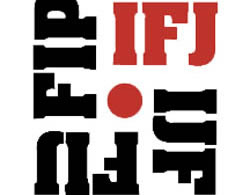
Christopher Warren, immediate past President, International Federation of Journalists, and Federal Secretary, Media, Entertainment & Arts Alliance to the Lasantha Wickrematunge commemoration, Colombo, Sri Lanka, February 15, 2011.
These last few weeks have been exhilarating for those of us who believe in democracy, human rights, freedom of speech and the press.
First Tunisia and now Egypt have embarked on the exciting, tumultuous journey to free and democratic societies. There can be no doubt that the most difficult part of that journey is still to come and those countries – and the dominos that will inevitably follow them – will require all the support possible from the international community of friends and supporters of democracy.
And there can be no doubt that there will be stumbles and disappointments along the way. But there can be no doubt that the end result will be a freer, more open – more normal – society.
The events in north Africa are exhilarating not just for their own sake. They are a beacon to the world.
Partly this is due to the significance of Egypt as a central player in Africa and the middle East. It will force every country in the region to confront this question: If Egypt, why not us?
But it is significant beyond its own borders and its own region. It is significant because it marks the renewal of the global march to democracy and human rights.
Over the past decade, this march has stumbled due to two influences. First, the ill-named Global War on Terror came to justify restrictions on human rights in the name of security, to encourage the democratic world to compromise with authoritarian regimes in the name of fighting terror and conflated the spread of democracy with the use of armed force in Iraq and Afghanistan.
These restrictions came although as that great journalist Benjamin Franklin warned us over two centuries ago: “They who can give up essential liberty to obtain a little temporary safety, deserve neither liberty nor safety.”
Yet the sacrifices made in traditional democracies acted not only to set back human rights in those countries. It sent a message to authoritarian regimes around the world that human rights was no longer the central concern that it should be for all democratic nations.
At the same time, the economic growth of China within the strict authoritarian rule of the Communist Party gave new life to the chimera beloved of leaders with authoritarian tendencies everywhere that economic growth occurs best when coupled with strong man rule despite the corruption that goes with it.
Yet we know from within our own region how false that is. All authoritarian regimes sooner or later hit a wall of economic growth that only genuine democracies can break through. We saw it in Korea and Taiwan in 1988 and in Indonesia in 1998. In all those cases, the crisis of authoritarianism could only be resolved through democratisation.
And now, the risings in Tunisia and Egypt have again put a full stop to both these lies. They reopen the understanding that you can only fight terror through democracy and only a democracy built on respect for human rights can guarantee a strong and vibrant economy that eliminates corruption.
There’s a further development that makes the examples of Tunisia and Egypt so exciting. They’ve been driven by the same groups that have been working for democracy throughout the world – human rights and press freedom NGOs, independent trade unions and working journalists.
They have not been driven by the traditional political or oppositional groups but from broad based networks reflecting the frustrations of the people.
For me – as I suspect it would have been for Lasantha - the example of journalists is particularly exciting.
We need to be honest – many journalists do well out of authoritarian regimes, particularly in cases like Egypt where so much of the media is state-owned. They get the perks of status and public recognition. They get to pontificate on national television about the inevitability of strong man rule. They get to hobnob with political heavyweights and get invited to drinks with the president. They are relatively well paid. Too many of our colleagues fall into the trap of comfort and compromise.
Yet, as in case after case of democratic revolution around the world, individual working journalists – particularly the rising generation - have rushed to place themselves at the centre of the north African risings.
Even within the state-owned media, journalists have been fighting for – and winning - a free media, for the right to report in the interests of the people, not of the State and the ruling elite. Some have walked out, rather than compromise their journalist principles.
And now we are seeing their battles paying off with the likely break-up and democratisation of State-owned media built on the principles of independent public service broadcasting and publishing and the strengthening of independent and private media.
It will be these reforms, more than any others, that will ensure that Egyptian and Tunisian democracy continues to surge forward. And it is these battles that must lie at the heart of the campaigning commitment of journalist communities.
It is clear from this, that there are many lessons to be learnt from north Africa, not least here in Sri Lanka.
As I said, in most of the world, democracy has marked time over the past decade.
Would that were the case here in Sri Lanka. Instead it has gone backwards. And the murder of Sivaram in 2005, of Lasantha Wickrematunge two years ago, the trial of Tissa, Jesiharan and Valamarty, the effective exiling of friends like Poddala, Sanath and Sunanda, and the disappearance of Prageeth Eknaligoda last year all stand as chilling monuments to that deterioration.
Each of these marked a different phase of that deterioration. The murder of Sivaram and the treason trials of Tissa, Jesiharan and Valamarthy all in their own way marked a common goal of both the Government of Sri Lanka and the LTTE – the elimination of any independent, questioning space in the Tamil community.
The bashing of Poddala Jayantha and others and forcing into exile so many other friends marked the attempt to eliminate the sort of independent network of journalists, human rights NGOs and independent unions in the media that, as Egypt and Tunisia shows, can be so challenging to an increasingly authoritarian ruling elite.
And the murder of Lasantha and the subsequent disappearance of Prageeth marked the attempt to eliminate a questioning and challenging media. I doubt there is a journalist in the country that didn’t hear and understand the message that these two events sent.
Lasantha’s powerful message from the grave And Then They Came for Me indicates how well he understood that the attacks on free and independent journalism did not come in a vacuum – they came as part of a concerted push against democracy and human rights.
He also well understood that, in being attacked, he was not being singled out. As he said, he did not travel the journey alone: “Fellow journalists in other branches of the media walked with me: most of them are now dead, imprisoned without trial or exiled in far-off lands.”
And yet, though his murder was only one of many, his standing in our craft meant his killing was more shocking than most. Here was one of this country’s most senior journalists, a fiercely independent editor of one of its leading independent papers, publisher of critical investigative exposes of corruption and wrong doing.
And yet, if his standing could not protect him, how should the rest of the craft stand up?
And yet journalists do. And that’s because, as the actions of many of our colleagues in north Africa have reminded us this year, free and independent journalism can only exist in a free and democratic society built on human rights.
We are like fish who cannot live without the sea of freedom of expression surrounding us.
An independent Sri Lanka is about the same age as the Universal Declaration of Human Rights, so it is no surprise that the challenge of human rights has been intertwined in the history of an independent Sri Lanka from the very beginning.
It has been a history punctuated with human rights abuses from the denial of citizenship to the upcountry Tamils in its very early days through to the murder of Lasantha and the disappearance of Prageeth. It has included some of the world’s most terrible events from the anti-Tamil Colombo pogrom in 1983 to the presentation of suicide bombings as the LTTE’s most enduring gift to the world Balancing these human rights abuses have been an enduring democracy, flawed and inadequate as it has been at times. A simulacrum of an independent judiciary has survived. Civil society has grown.
What intertwines human rights so deeply in the history of Sri Lanka is not that it has been the worst of societies, any more than it has been the best. It is that from the very beginning of the country’s independence, human rights have always been the central contested terrain of struggle.
I have long believed that the history of Sri Lanka can only really be written and understood as a history of the struggle for human rights.
With the murder of Lasantha, the disappearance of Prageeth, freedom of expression has become the centre of the struggle because you cannot have a society founded on human rights without the right of freedom of expression. And, you cannot have freedom of expression without a society founded on human rights.
Freedom of expression underpins some other rights directly – the right to practice your religion freely, the right to peaceful assembly as well as freedom of speech or, narrowest of all, freedom of the media. None of these rights exists without the right to freely express.
It’s integral to the rights of women, minority groups and disadvantaged groups. They cannot be empowered without being empowered through their own freedom to express themselves. That’s why I have no truck with those who argue that freedom of expression is marginal to the struggles of the disadvantaged. Those struggles cannot even have the words to express themselves if they are not empowered to speak.
It’s bundled up in the right to a fair trial – part of a fair trial is to be tried in the open.
And it underpins all other rights – rights of security, rights against arbitrary arrest, rights to citizenship, rights against torture because it – along with an independent judiciary – is the means for enforcing these rights. It’s the means for exposing abuse and by exposing end them
Freedom of expression is the catalyst that enables every other right to be freely exercised.
While freedom of the press is really only a subset of the broader right of freedom expression, traditionally, it’s been through journalists like Lasantha and Prageeth bravely exercising our craft here in Sri Lanka that the struggle for human rights has been reported and made known.
And that’s why they and so many other journalists have become the target.
Like every other person, a journalist has a right against abduction, against illegal imprisonment, against torture and against murder. Yet now, for reporting, for analysing, for questioning, for – in short – doing their job, too many journalists have found themselves in the vortex of spiralling human rights abuse in Sri Lanka.
And so Lasantha was murdered and Prageeth disappeared.
It is easy in this environment to think things will never get better.
But Tunisia and Egypt show the decade of marking time is over.
Yet again, authoritarian rule has failed the people – even the sort of soft authoritarianism that uses the veneer of elections to conceal the abuse of human rights.
And it will be up to journalists to make a difference – but it will not be up to us alone. We need to learn the lessons that our friends and colleagues in Tunisia and Egypt have taught us all over again.
First, we cannot compromise our craft. Journalism in the service of an authoritarian state is not journalism at all. It is merely words on a page or voices in the airwaves. Journalism must stand, as it always has, for respect for the truth and respect for the public’s right to know.
Second, we must continue to stand together. The solidarity of the organised media community in Sri Lanka – reflected in the coming together of the six organisations – is a model for the island. The media community – the journalists community - is the only community that appears to be capable of transcending the divisions that cause so much havoc in Sri Lanka.
I know that solidarity has been tested over the past two or so years. It is understandable that under the unbearable pressure that journalists have been under, that tensions have broken out. We all know some friends and colleagues have felt abandoned as a result.
Yet that support and solidarity has largely endured and made bearable the pressures that journalists have faced. And now, it lays the basis for renewing the struggle for a genuinely free and democratic media.
And third, emerging information technologies are shattering the monopoly we used to enjoy as the sole conduit of information to our communities.
Now, newspapers, radio and TV are no longer the sole source of information. Social media like Twitter and Facebook and Web 2.0 like bloggers, citizen journalists and news web sites all add immeasurably to the mix, although none of them are a substitute for independent journalism. We can see the challenge they pose to elites with the recent burning of LankaENews.
But they do more than simply add to the total volume of information.
The potential of these technologies shatters the paradigm that successive Sri Lankan governments have followed. They cannot shut off the faucet of news and information by political appointments to run state-owned media, pressuring advertisers to abandon independent media and threatening, abusing and murdering journalists.
Finally, we need to remember that the risings in Tunisia and Egypt were driven as much by the economic failings of authoritarian rule – and this is the blow it strikes against the so called “China model”.
The people in Tahrir Square in Cairo know what every economist knows: authoritarian rule – soft or hard – inevitably acts to conceal corruption and corruption is the major impediment to genuine economic growth and decent living standards for ordinary people.
Rising prices, unemployment and underemployment, corruption – only a democracy built on human rights can confront these challenges.
Despite all this, when it comes to human rights and freedom of expression, the Sri Lankan government is like a general fighting the last war, using the tactics that worked so well in the 1980s and at a loss to understand why they do not work this time around.
And as they have struggled to understand, the government and their military and paramilitary allies, lashed out ever more wildly and ever more journalists fell victim to their failure to understand the world in which we all live.
And, in the short term, they prevailed.
But now, the challenge for us as journalists, as believers in democracy and human rights, is to seize the historic turning that north Africa has illuminated.
We have to reassert the fundamental right of all the peoples of the world and of Sri Lanka. The right to have real meaning put into democratic structures and to have them leavened with human rights, including the right to safety and the right to freedom of expression.
Like Sri Lanka, my country is an island. But as the global march of democracy and human rights resumes, no countries will be islands for long.

|
British MPs urge the Prime Minister to support an independent, international war crimes investigation in Sri Lanka
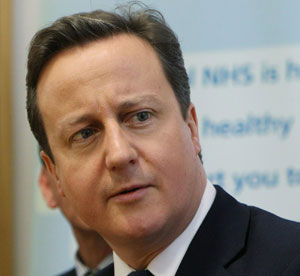
Today, 41 British MPs drawn from the three major parties at Westminster, have written to the British Prime Minister David Cameron urging him to add Britain’s support to calls for an independent, international inquiry into allegations of war crimes committed during Sri Lanka’s 25 year civil conflict (letter is attached). The MPs are all Members or Supporters of the All Party Parliamentary Group for Tamils.
This is a major issue of concern for British parliamentarians, and follows credible evidence provided by the US State Department, the European Commission and International Crisis Group, as well as the findings of the UN Special Rapporteur on extrajudicial, summary or arbitrary executions, that war crimes could have taken place in Sri Lanka. The MPs believe it is important for the future prospects of peace and reconciliation on the island that these allegations
are investigated in a robust and impartial fashion.
The timing of this letter is significant. It comes as the international community awaits publication of the report of the United Nations Advisory Panel, appointed by Ban Ki-Moon to advise him on the matter of war crimes accountability in Sri Lanka.
Vice Chair of the Group, Siobhain McDonagh MP, said:
“The Prime Minister and Foreign Secretary have made welcome statements recently about the need for Sri Lanka to have a credible and independent way of addressing these allegations of violations human rights during the civil war. But this can only have credibility if it takes place under international auspices because serious concerns have been raised around the world about Sri Lanka’s previous efforts to investigate severe human rights abuses.
“If he supports the All Party Group in this way, the Prime Minister will be sending a powerful message to the United Nations Secretary General that Britain backs an independent, international war crimes inquiry. He would also send a powerful message to the people of Sri Lanka that Britain supports human rights, justice, reconciliation and peace on the island.”
The Full Text of the letter sent to the British Prime Minister and names of signatories are reproduced below:
Rt Hon David Cameron MP
The Prime Minister
10 Downing Street
London SW1
February 2011
Dear Prime Minister,
The need for an independent international investigation into war crimes in Sri Lanka
We are writing to urge you to use all the powers at your disposal to support calls for an independent international investigation into the alleged war crimes that occurred during Sri Lanka’s 25-year civil war. As you know, members of the Congress of the United States have already written to the Secretary of State there to ask her to call for such an investigation, and we should like the British Government to put its full weight behind this proposal.
In October 2009, the European Commission published a report on human rights in Sri Lanka since the war. It said “During the period covered by the investigation, there has been a high rate of unlawful killings in Sri Lanka, including killings carried out by the security forces, persons for whom the State is responsible and the police.” It added: “Extra-judicial killings were widespread and included political killings designed to suppress and deter the exercise of civil and political rights… Unlawful killings perpetrated by soldiers, police and paramilitary groups with ties to the Government, have been a persistent problem.”
In the same month, the US State Department listed numerous crimes that they believed required further investigation, including intentional bombing of civilian and humanitarian organisations, the use of child soldiers, extrajudicial abuse and detention of unarmed civilians and former combatants, the killing of captives or combatants seeking to surrender, and individual disappearances.
There is, therefore, certainly enough evidence to conclude that war crimes could have taken place in Sri Lanka, particularly towards the end of the civil war there, and we believe they can only be investigated effectively if investigations are carried out independently.
Along with many colleagues around the world, we believe that only an independent investigation can inspire confidence and achieve reconciliation. This is because, as Congress members noted, Sri Lanka’s past efforts to investigate severe human rights abuses have not been successful and inspire no confidence that new internal investigations will be credible. These concerns are supported by numerous reputable institutions around the world.
The International Crisis Group argues “An international inquiry into alleged crimes is essential given the absence of political will or capacity for genuine domestic investigations, the need for an accounting to address the grievances that drive conflict in Sri Lanka, and the potential of other governments adopting the Sri Lankan model of counter-insurgency in their own internal conflicts.”
Amnesty International has pointed out that there have already been 9 commissions of enquiry formed by the Government of Sri Lanka since 1991 to investigate human rights issues including disappearances. Amnesty has said they have lacked credibility, delayed criminal investigations and have been subject to government interference, with several commission members resigning in protest.
A Report by Desmond Tutu and Lakhdar Brahimi, for The Elders, also describes a Sri Lankan commission as “not nearly enough” and that what is needed is an independent, international inquiry.
In line with the members of Congress who wrote to the Secretary of State, we believe it is in the international community’s best interests – and the best interests of the United Kingdom, as well as of Sri Lanka – to ensure a lasting peace in Sri Lanka after such a long period of ethnic conflict. However, we believe that peace can only be reached once the full truth is known and understood.
For all these reasons, we ask you to announce Britain’s support for a robust and independent international investigation that would clarify what occurred during the conflict and offer the best hope of a sustainable peace in Sri Lanka.
Yours sincerely,
Lee Scott (Chair)
Virendra Sharma (Vice Chair)
Siobhain McDonagh (Vice Chair)
Simon Hughes (Vice Chair)
Heidi Alexander
Ian Austin
Hazel Blears
Peter Bottomley
Russell Brown
David Cairns
Martin Caton
Katy Clark
Jeremy Corbyn
Stella Creasy
Jon Cruddas
Jim Cunningham
John Cryer
Jim Dowd
Clive Efford
Mike Gapes
Barry Gardiner
Mary Glindon
Robert Halfon
Tom Harris
Margaret Hodge
Sharon Hodgson
George Howarth
David Lammy
Andy Love
John Mann
Stephen McCabe
John McDonnell
Teresa Pearce
Steve Pound
Nick Raynsford
Chris Ruane
Joan Ruddock
Stephen Timms
Emily Thornberry
Gareth Thomas
Keith Vaz
(Press Release from the All Party Parliamentary Group for Tamils)

|
Whither independent Judiciary ? –Ministry permission needed even to enforce a court order - Anoma Fonseka
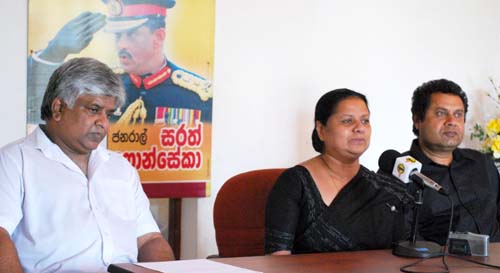
(Lanka-e-News, 17,Feb.2011, 11.18AM) Anoma Fonseka said, the order issued by the Colombo High court to make arrangements to provide General Sarath Fonseka with a hot water Geyzer had not been implemented because this request has been forwarded to the relevant Ministry for its permission.
In this country which is supposed to be following the Democratic tenets, there is another Institution which is wielding a greater power controlling the judicial court. This is a case in point, she pointed out. The General is facing difficulties in using the water provided in the buckets by the prisons kitchen owing to the wounds on his neck he sustained when he fell victim to a LTTE suicide bomb attack. It is well to remind all those who have forgotten that the General suffered all this and more to save the country and eventually to win the war. But as a reward for his sincere patriotism, Heroism and sacrifices, the reward he received was imprisonment finally, she added.
Anoma Fonseka made these comments at the maiden media briefing on the 15th following the inauguration of the new political party of Gen. Sarath Fonseka.
We are compelled to reveal these happenings in the prison at the media briefing because now there is no other way to make it known to the public. The public should know that there is a more powerful force controlling even the independent judiciary. In a Democracy, an independent sacrosanct judiciary is indispensable, but even that is now eroded, she pinpointed.
As a mother,a woman and a housewife, I can now understand well the difficulties we have to face even to prepare a single meal.
We are all living in dire hardships. All of you know that even the General’s pension had been withdrawn. If we can feel the difficulties so acutely, it is imaginable how much the Govt. servants and those in the lower social classes are suffering.
If a full stop must be put on this, we must as women rise against this. All these hardships are because of the profligacy and fiscal mismanagement of the Govt. Just look at the expenditures incurred in maintaining this extravagant Jumbo Cabinet which is ever bloating. The lavish expenditures on wasteful Tamashas and tawdry exhibitionisms. Women are so desperate that they have no time to think of anything except occupying themselves fully on how to cut the coat according to the cloth with a Govt. that is unable to even provide the bare cloth, she bemoaned. In the circumstances, our women who are all in dire straits should take stern measures to oppose this despotic Govt.’s fiscal blunders and wastages in the interest of the common people, she noted.
|
Forcible take over of land of an infant’s school: Are we living among plunderers and barbaric officers? -Ven. Barnagala Upaitissa Thero
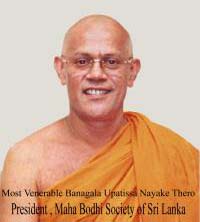
(Lanka-e-News, 12, Feb.2011, 11.00AM) The Chairman of the national housing development Authority (NHDA) along with police officers had at midnight intruded into the premises where an International infants School was being run, and had divided the land on which the School stood into two by barb wiring. One part has been given over to the Homagama local Govt. council and the other part has been appropriated by the NHDA by force. The NHDA comes under the purview of the Ministry of housing, construction, engineering and common amenities of which the Minister is Wimal Weerawansa.
It is the Narita infants School at Mattegoda that has been so acquired.
The Chairman of this Narita infants School chain is Ven. Barnagala Upaitissa Thero. He is a chief Sangha member of Japan, the chief incumbent of the Dambadiva Sanchi Vihara and Sri Lanka Maha Bodhi Association President.
This forcible action of barb wiring and dividing this School had been done on 30 Jan. at 12.00 midnight.
When Lanka e news inquired from Ven. Barnagala Thero, he said, in December 2010, the NHDA had intimated to him that the School was being run on an unauthorized land. Whereupon the Ven. Thero had submitted all the official documents pertaining to the ownership of that land. Yet,, without making any investigations into this,while he was not in the Island, with the help of goons and a violent gang, the Chairman of the NHDA who had also conducted himself as a hooligan taken over this land, the Thero lamented.
|
|
People harassed by Namal's lackey
2010 | 12 | 23
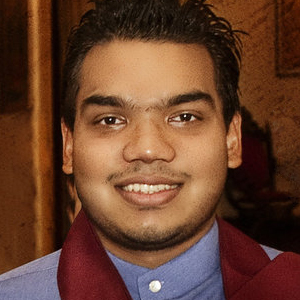
People have been harassed by the holiday resort that is being carried out in Modera Road in Medaketiya, Tangalle. The holiday resort is being operated by one of Namal Rajapaksa's close associates called Dharmadasa alias Daham.
The holiday resort is also used as a brothel and sells liquor without a permit. Several reports have been received of incidents where persons after consuming liquor at the resort have harassed ladies walking down the road. People in the area say that although complaints have been lodged against the resort at the Tangalle Police, no action has been taken.
It is learnt that the police inaction is due to the fact that the resort is being operated due to the needs of several police officers and politicians in the Tangalle area.

|
|
Mervyn and son supply drugs to the South
2010 | 12 | 22 

Public Relations and Public Affairs Minister Mervyn Silva's son Malaka Silva is the main supplier of narcotics to the Mambo Restaurant in Hikkaduwa, which is considered the base of the Southern drug ring, reliable sources told Lanka News Web.
The restaurant and night club, which is being operated by two brothers Sandika and Indika, is a popular hangout of foreigners who consume drugs as purchases could be made over the counter without any middle men. A miligram of cocaine could be purchased at Rs. 18,000, an “ice” pill between Rs. 5,000 and Rs. 7,000, Lanka News Web learns.
Apart from Hikkaduwa, the Mambo holiday resort is also located in the Eastern beach of Arugam Bay. Mambo's in Arugam Bay is also the base of the drugs ring in the East.
Malaka visits Mambo's in Hikkaduwa every two weeks to to supply the narcotics to the restaurant. He receives the services of several Russian girls for this operations and it is these girls who carry out the work under Malaka's supervision.
Lanka News Web further learns that Malaka Silva uses the brand new Jaguar car received by Mervyn as a gift from the President when he makes these visits to Hikkaduwa and interestingly, he is provided with a police escort when making these visits. Therefore, Malaka's drug operation is carried out with police protection.

|
|
|
|
!! f,dj jgd fjfik ,dxlSh foaYfm%añkaf.ka flfrk b;d jeo.;a ldf,daÑ; b,a,Suhs !!
f,dj jgd fjfik ,dxlSh wjxl foaYfm%añka jk Tn ieu úiskau" fkdmudj" fuu Ahfesl.org udkj ixúOdkh wkq.%yfhka ms<sfh, lr we;s fuu msgqj Download lr th E-mail yryd fyda ;eme,a ud¾.fhka fyda Fax ud¾.fhka fyda f,dj jgd mj;ajd hk ta ish¨ rdcH wdh;k j,g iy cd;Hka;r ixúOdk w;r fnod yrskak' foaYmd,k ixúOdkhla yryd flfrk b,a,Sulg jvd fujeks udkj ys;jdos ixúOdk ;=<ska flfrk b,a,Sï flfrys cd;Hka;rh oeä úYajdih ;nk nj wu;l fkdlruq'
flfia fyda wmf.a fuu n,f,daNS fudav wuk isxy, iq¿;rhf.a fuu ñf,aÉP my;a l%shdjkg nqoaêu;a nyq;r isxy, wfma oeä úfrdaO;djh fmkajd tu jHikhkaf.ka wm rg;a cd;sh;a cd;Hka;rju iqrlsuq' 1983 fuka l¿ cQ,shla we;slr isxy,hd ñf,aÉPhd f,i cd;Hka;rj m;a lr,Sug fuu n, f,daNS fudav wuk isxy, iq¿;rhg kej;;a bv fkd;nuq' cd;s fNao" wd.ï fNao" mCI fNao" fï ish,a, bj; oud Y%S ,xldfõ fjfik isxy, nyq cd;sh jYfhka ta ienE nqoaêu;a foaYfm%añ isxy, wm úiskau wfma iq¿ cd;Ska wdrCId lrkakg ne|S isák nj f,dalhd bosrsfha fmkS isáuq' fuu wmrdO ish,a, n, f,daNS md,lhkaf.a myiqjg;a" jdishg;a" wgjk foaYSh iy cd;Hka;r W.=,a nj wu;l fkdlruq'
Ahfesl.org udkj ixúOdkh ^ 23'11'2010 & |
|
|

Everybody who opposes a pure Sinhala Govt. will be murdered –threat from Dutugemunu Balakaya
(Lanka-e-News -22.Nov.2010 11.30PM)
A group calling itself the ‘ Dutugemunu balakaya’ has sent letters of threats to some lawyers at Hultsdorf that all those who are traitorous will be murdered.
These letters have been received by them yesterday (21) . These threatening letters from the Dutugemunu Balakaya has been received by Lawyers who are engaged in legal actions for and on behalf of Democracy.
These letters holding out grave threats state that when the terrorism demanding division has been destroyed and efforts are being made to unite the country , local and international websites ,newspapers and Lawyers who appear on behalf of these media and all others who are traitorous in respect of the country will be murdered .
The letter further states that everybody who opposes the creation of a pure Sinhala Govt. will be murdered.
Threatening letter as follows


Tout le monde qui s'oppose à une pure cinghalaise Gouv. sera assassiné
<< à la menace de Dutugemunu Balakaya >>
(Lanka-e-News-22.Nov.2010 23:30)
Un groupe se faisant appeler «balakaya Dutugemunu 'a envoyé des lettres de menaces de certains avocats à Hultsdorf que tous ceux qui sont traîtres seront assassinés.
Ces lettres ont été reçues par eux hier (21). Ces lettres de menaces de la Balakaya Dutugemunu a été reçu par les avocats qui sont engagés dans des actions juridiques pour et au nom de la démocratie.
Ces lettres tendant graves menaces état que lorsque la division terrorisme exigeante a été détruit et des efforts sont faits pour unir le pays, des sites web locaux et internationaux, des journaux et des avocats qui se présentent au nom de ces médias et tous ceux qui sont traîtres à l'égard de le pays sera assassiné.
La lettre mentionnait également que tout le monde qui s'oppose à la création d'une pure Govt cinghalais. sera assassiné.
lettre de menaces comme suit

|


|
Very Dangerous Situation in Sri-Lanka
Très dangereuse situation au Sri-Lanka
This situation is very dangerous for Democracy Sri-Lanka
Cette situation est très dangereuse pour la démocratie au Sri-Lanka
All governements of the world and Human Rghits Associations take very serious actions against this stupid barbaric action.
Tous les Gouvernements du monde et Toutes les Associations droits de l'homme prendre des mesures très sévères contre cette action barbaric stupide.
( Ahfesl.org - 23.11.2010 )
 |
|
Association Humanitaire Franco Européenne Sri Lankaise |
|
|
|
E-mail :  francoeurope-srilanka@hotmail.fr francoeurope-srilanka@hotmail.fr
For more informations about Sri-Lanka Politics & Human Rights enter our web site : http://ahfesl.free.fr or ahfesl.org
Pour plus d'informations sur Sri-Lanka Politique et droits de l'homme entrer dans notre site web : http://ahfesl.free.fr or ahfesl.org |
|
|
Massive protest in France calling for democracy in Sri Lanka
A massive protest was held outside the Sri Lankan embassy in France on the 19th, the day President Mahinda Rajapaksa was sworn in for his second term in office. The protesters called for the re-establishment democracy in Sri Lanka and the immediate release of Sarath Fonseka from jail.
The protest was organized by the Movement for Democracy in Sri Lanka's French branch. A large number of Sri Lankan expatriates had participated in the protest regardless of religious and political affiliations.
The photograph shows an embassy official videoing the protest outside the Sri Lankan embassy.
Y%S ,xldfõ m%cd;ka;%jdoh ia:dms; lrk f,i b,a,d m%xYfha ±jeka; Woaf>daIKhla
2010 | 11 | 21
rdcmCI wdKavqfõ uer m%ydr jyd kj;k f,i;a Y%S ,xldfõ m%cd;ka;%jdoh ia:dms; lrk f,i;a yd widOdrK f,i isrlr isák fckrd,a ir;a f*dkafiald uy;d jyd ksoyia lrk f,i;a b,a,d ckêm;sjrhdf.a fojk moú m%dma;sh osk ^19od& m%xYfha Y%S ,xld ;dkdm;s ld¾hd,h bÈßmsg§ Woaf>daIKhla mj;ajd ;sfí'
Y%S ,xldfõ m%cd;ka;%jdoh i|yd jQ jHdmdrfha m%xY YdLdj úiska ixúOdkh lrk ,o fuu Woaf>daIKhg foaYmd,k wd.ï fíofhka f;drj meßisfha isák Y%S ,dxlslfhda /ila iyNd.S ù we;'
my; PhdrEmfhka oelafjkafka ;dkdm;s ld¾hd<fha ks,Odßhl= úiska tu Woaf>daIKh rEm .; lrk wdldrhhs'
|
Worried about their homeland…
November 20, 2010
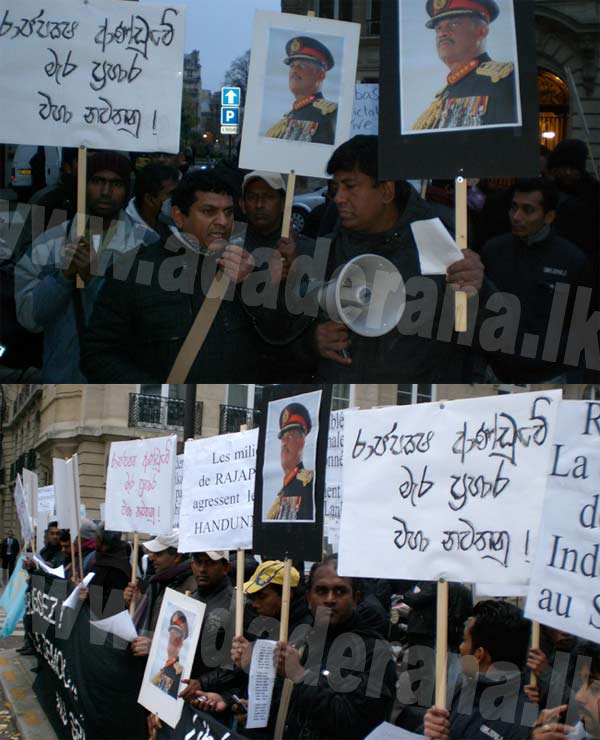
A group of Sri Lankan expatriates in France held a protested yesterday (19 November) in Paris against the current Sri Lankan regime and the imprisonment of Sarath Fonseka. The protest which was organized by the ‘Movement for Democracy in Sri Lanka’ was held consequent to the swearing in of Mahinda Rajapaksa on his 2ndterm as the president also yesterday. (Pic by Mano Banduwardena)
http://www.adaderana.lk/news.php?mode=head&nid=614
|
|
WFDY STATEMENT AGAINST ONGOING REPRESSION OF STUDENTS IN SRI-LANKA
2010-11-12

The World Federation of Democratic Youth is deeply concerned with the ongoing state repression of students in Sri-Lanka.
We strongly believe that students’ oppose to the mushrooming of private university for business is the legitimate act of Inter-University Student Federation. The elected body of students has the primary rights to defend educational rights of students.
Most worrying and condemnable act is that the state is continuing its detention to student leaders and expelling the students from
universities allegedly forwarding the case of clashes for educational rights happened between students and police in front of Ministry of Higher Education.
Comrade Udul Premaratne the leader of Inter University Student Federation has already been detained for 10 days along with 31 detaining students still in jail and suspending 221 students from University. Student Monks are also suspended and female students are boycotting the exams. Student council leaders are arrested. Such acts are solely violation of human rights and most condemnable.
The World Federation of Democratic Youth has always been defending for free and quality education for everybody that should be the responsibility of the state. We fully support for the unheard and repressed voice of students in Sri-Lanka against privatization of education along to our member organization Inter University Students Federation, Sri-Lanka.
We urge the government of Sri Lanka to stop repressive measures taken against students, to withdraw suspended cases of student from University and free to those who are detained in jail.
We strongly demand for the withdrawal of privatization policy of University in front of Sri-Lankan Government and to respect the voices of students.
We urge hereby to all WFDY member organizations to put pressure against Sri Lankan government to stop this repression and to extend your solidarity with ongoing student struggle in Sri Lanka for a just cause.
|
|
90 Ministers Sworn in New Ministers sworn in
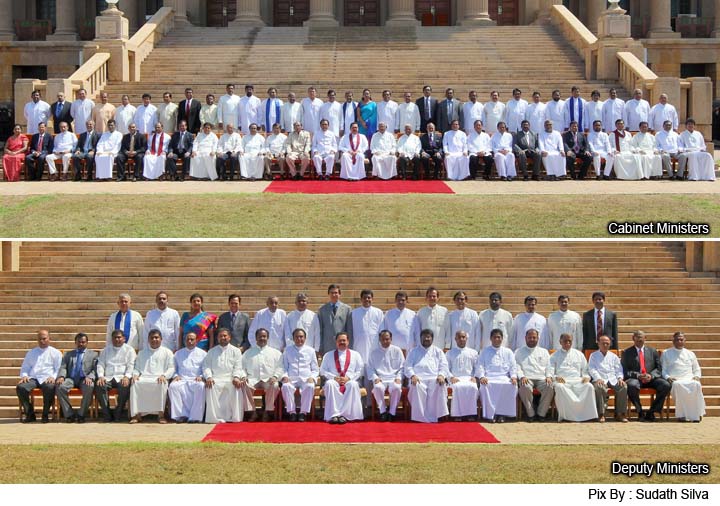
(Lanka-e-News, Nov.22, 2010, 12.44PM) The new Cabinet & Deputy of Ministers of the UPFA government was sworn in before President Mahinda Rajapaksa at the Presidential Secretariat this morning (22 Nov).
The new cabinet comprises 09 Senior Ministers and 49 Cabinet Ministers. 31 Deputy Ministers were also sworn in.
Following is the list of Cabinet Ministers and their portfolios:
Cabinet of Ministers
Prime Minister
D. M. Jayaratne – Buddha Sasana & Religious Affairs
Senior Ministers
Ratnasiri Wickramanayake – Good Governance & Infrastructure Facilities
D E W Gunasekara – Human Resources
Athauda Seneviratne – Rural Affairs
P. Dayaratne – Food & Nutrition
A. H. M. Fowzie – Urban Affairs
S. B. Nawinna – Consumer Welfare
Piyasena Gamage – National Assets
Prof. Tissa Vitharana – Scientific Affairs
Dr. Sarath Amunugama – International Monetary Cooperation
Other Cabinet Ministers
1. Nimal Siripala - Irrigation & Water Resources Management
2. Maithreepala Sirisena – Health
3. Susil Premajayantha – Petroleum Industries
4. Arumugam Thondaman - Livestock and Rural Community Development
5. Dinesh Gunawardena - Water Supply & Drainage
6. Douglas Devananda - Traditional Industries & Small Enterprise Development
7. A. L. M. Athaullah - Local Government & Provincial Councils
8. Rishad Bathiyutheen - Industry & Commerce
9. Champika Ranawaka - Power & Energy
10. Wimal Weerawansa - Construction, Engineering Services, Housing & Common Amenities
11. Rauff Hakeem –Justice
12. Basil Rajapaksa –Economic Development
13. Vasudeva Nanayakkara – National Languages and Social Integration
14. S. B. Dissanayake – Higher Education
15. Prof G.L. Peiris – External Affairs
16. W. D. J. Seneviratne - Public Administration & Home Affairs
17. Sumeda G Jayasena - Parliamentary Affairs
18. Jeevan Kumaranatunga – Postal Services
19. Pavithra Wanniarachchi – Technology and Research
20. Anura Priyadarshana Yapa – Environment
21. Tissa Karaliyadde – Child Development and Women's Affairs
22. Gamini Lokuge – Labour and Labour Relations
23. Bandula Gunawardena – Education
24. Mahinda Samarasinghe – Plantations
25. Rajitha Senaratne – Fisheries and Aquatic Resource Development
26. Janaka Bandara Tennakoon – Land and Land Development
27. Felix Perera – Social Services
28. C B Rathnayake – Private Transport Services
29. Mahinda Yapa Abeywardena – Agriculture
30. Keheliya Rambukwella – Mass Media and Information
31. Kumara Welgama – Transport
32. Dullas Alahapperuma – Youth Affairs and Skills Development
33. Johnston Fernando – Cooperatives and Internal Trade
34. Chandrasiri Gajadeera – Rehabilitation and Prison Reforms
35. Salinda Dissanayake – Indigenous Medicine
36. Reginold Cooray – Small Export Crops Promotion
37. Dilan Perera – Foreign Employment Promotion and Welfare
38. Jagath Pushpakumara – Coconut Development and State Plantations Development
39. T B Ekanayake – Culture and Aesthetic Affairs
40. Mahinda Amaraweera – Disaster Management
41. S M Chandrasena – Agrarian Services and Wildlife
42. Gunaratne Weerakoon – Resettlement
43. Mervin Silva – Public Coordination and Public Affairs
44. Mahindananada Aluthgamage – Sports
45. Dayasritha Tissera – State Assets and Enterprise Development
46. Ranjith Siyambalapitiya – Telecommunication and Information Technology
47. Jagath Balasuriya – National Heritage
48. Lakshman Seneviratne – Productivity Promotion
49. Navin Dissanayake – State Management Reforms
Deputy Ministers 1. Susantha Punchinilame – Fisheries and Aquatic Resources Development Deputy Minister
2. Lakshman Yapa Abeywardena – Economic Development Deputy Minister
3. Rohitha Abeygunawardena – Ports and Highways Deputy Minister
4. Pandu Bandaranaike – Indigenous Medicine Deputy Minister
5. Jarathne Herath – Industry and Commerce Deputy Minister
6. Duminda Dissanayaka – Youth Affairs and Skills Development Deputy Minister
7. Lasantha Alagiyawanna - Construction, Engineering , Services Housing and Common Amenities Construction, Engineering , Services Housing and Common Amenities Deputy Minister
8. Rohana Kumara Dissanayaka – Transport Deputy Minister
9. H.R. Mithrapala – Livestock and Rural Community Development Deputy Minister
10. Nirmala Kotelawala – Ports and Highways Deputy Minister
11. Premalal Jayasekara – Power and Energy Deputy Minister
12. Githanjana Gunawardena – Finance and Planning Deputy Minister
13. Vinayagamoorthy Muralitharan – Resettlement Deputy Minister
14. Faiszer Musthapha – Technology and Research Deputy Minister
15. Indika Bandaranayake – Local Government and Provincial Councils Deputy Minister
16. Muththu Sivalingam – Economic Development Deputy Minister
17. Siripala Gamlath – Lands and Land Development Deputy Minister
18. W.B. Ekanayaka – Irrigation and Water Resources Management Deputy Minister
19. Chandrasiri Sooriyarachchi – Social Services Deputy Minister
20. Nandimithra Ekanayaka – Higher Education Deputy Minister
21. Nirupama Rajapaksa – Water Supply and Drainage Deputy Minister
22. Lalith Dissanayaka – Health Deputy Minister
23. Sarana Gunawardena – Petroleum Industries Deputy Minister
24. Vijith Vijayamuni Soysa – Education Deputy Minister
25. M.L.A.M. Hisbullah – Child Development and Women’s Affairs Deputy Minister
26. Weerakumara Dissanayaka – Traditional Industries and Small Enterprise Development Deputy Minister
27. A.D.S. Gunawardena - Buddha Sasana and Religious Affairs Deputy Minister
28. Earl Gunasekara – Plantation Industries Deputy Minister
29. Basheer Segu Dawood – Co-operatives and Internal Trade Deputy Minister
30. Abdul Cader – Environment Deputy Minister
31. Dulip Wijesekara – Disaster Management Deputy Minister
|
|
|
|
President Rajapaksa takes oaths
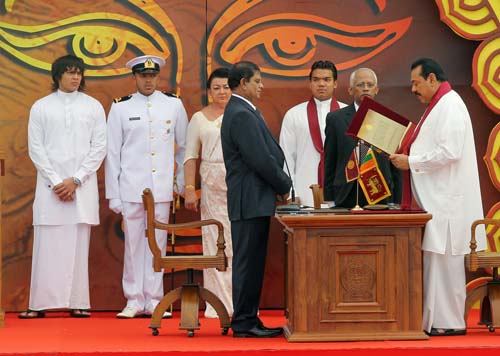
President Rajapaksa takes oaths
(Lanka-e-News, Nov.19, 2010, 2.40PM) The second term of office of President Mahinda Rajapaksa started at the auspicious time of 10.16 am when he was sworn in today (19) before the Chief Justice Asoka De Silva at the Presidential Secretariat. Following the swearing in the President will address the nation from the Presidential Secretariat where this historic even took place.
President’s Secretary Mr Lalith Weerathunga read out the proclamation in all three languages Sinhala, Tamil and English. Special representatives from Bhutan, China, Maldives and Pakistan are among a large number of official foreign representatives attended the ceremony in Colombo.
|
(Lanka-e-News, Nov.19, 2010, 2.40PM)
|
|
|
|
|
Even as President takes oaths Anoma Fonseka breaks coconuts at Kali Kovil
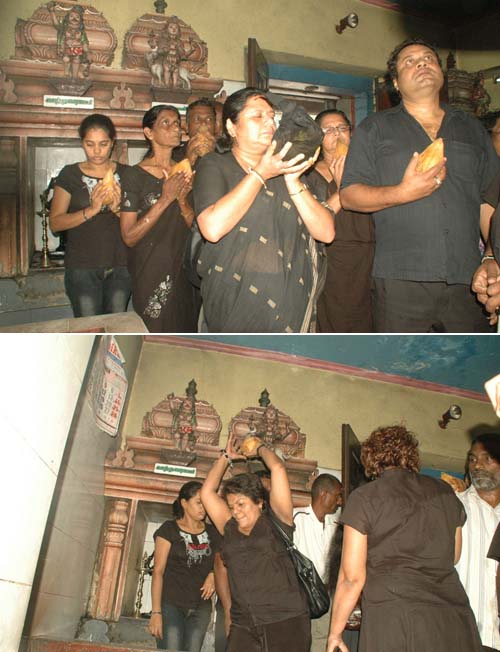
(Lanka-e-News, Nov.19, 2010, 11.55 PM)
When President Mahinda Rajapakse took oaths as the President for his second term in office at the auspicious time this morning (19), Anoma Fonseka the wife of Sarath Fonseka broke coconuts at the same time at the Kali amma Kovil in Kochchikade entreating the deity to save the country from the present stinking Govt. and to free Sarath Fonseka.
Jayantha Kettagoda and other DNA members also took part in this ceremony.
The pictures depict Anoma Fonseka and the front liners holding coconuts and entreating Kali amma deity to provide them relief. |
Created by : Ahfesl.org 19.11.2010 |
|
|
|
|
Most Ven. Reverend Malcolm Ranjith elevated to Cardinal status
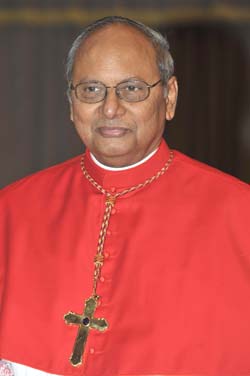
(Lanka-e-News, Nov.21, 2010, 10.20PM) Most Ven. Reverend Malcolm Ranjith was appointed as the second Sri Lankan Cardinal at the Vatican, Rome yesterday (20).
Malcolm Ranjith was born on 15th November 1947 at Polgahawela. His father’s name is Patabendige Don William and his mother is Mary Winifreda. Malcolm Ranjith was their first child. He recived the clergy status on 29th June 1975. On 15th June 1991, he was appointed as the Archbishop by the most Ven. Pope Paul the 2nd.
At the felicitation ceremony of the Rev. Malcolm Ranjith following his appointment as Cardinal by the Pope Benedict the 12th at the St. Peter’s square at the Vatican, Rome, Ministers, Parliamentarians and a large number of Sri Lankans regardless of religious differences participated and Rev. Neville Joe Perera coordinated the function, according to our correspondent in Italy.
35 years ago Most Ven.Rev. Cooray was the first Sri Lankan to be appointed as the Cardinal.
|
CHANGES WE LIKE TO SEE IN THE PRESIDENT'S SECOND TERM
2010-11-19

Sri Lanka President sworn-in for a second term
President Rajapaksa took his oaths today to the most powerful position in the Sri Lankan polity. He has won the confidence and trust of a majority of the general population as the commander-in-chief of the Sri Lankan armed forces who provided overall leadership to eliminate war and terrorism from the country.
Unlike his predecessors, President Rajapaka will not face any armed or territorial challenge to his government's rule in his second term. With his reputation and powers the president is well positioned to steer the country on to a new path of peace and democracy. From a peace building and even a development perspective the main challenge facing Sri Lanka is to come up with a
political solution to the ethnic conflict after the war. This includes the active acceptance that all communities be they Sinhalese, Tamils or Muslims have suffered, been displaced at various points in time and need to be compensated and re-empowered as individuals and communities.
A full national celebration, embracing all communities would be the beginning of free collaboration in all spheres. One of the disappointing features of the whole series of magnificent events that had been organized to celebrate the president’s oath taking was that it had little or no participation of communities from the north and east who also shared in the three decade conflict suffering and needed to be given an opportunity to share in the fruits of peace and national amity if the nation is to truly foster reconciliation. In addition, many government members who speak on behalf of the government both in Sri Lanka and abroad tend to give the impression that the vanquishing of the LTTE on the military battlefield has solved the country's main problem and opened the door to development. But development and raising the living standards of the Tamil people will not make the demands of the ethnic minority disappear.
The experience of other countries has shown time and again that when people develop economically they become more insistent in their demands for some form of self governance unless this need is pro-actively met. The rise of militancy in the south and terrorism in the north and east were as a result of unfulfilled aspirations of those societies and especially of their youth. The National Peace Council urges the President to address the roots of the ethnic conflict that gave rise to the war, instead of denying its existence because the LTTE was defeated and hoping for development to make the ethnic demands vanish.
In accordance with the trends in international thinking, political stability, peace and justice are seen to flow from respect for democracy, human rights and the prevalence of the rule of law through the existence of independent institutions. Institutional safeguards alone will not ensure that those holding office will act independently without being beholden to the appointing authority. We need men and women of conscience who respect truth and fairness, appointed to posts in the administration of justice. Since the President has untrammeled authority in appointments after the 18th Amendment it is his duty to appoint such individuals instead of those who seek power and positions.
President Mahinda Rajapaksa's wish to ensure that his second term of presidential office is one that ushers in an era of prosperity to the country requires that the government recognizes the trends in accepted principles in the world that give primacy to the rule of law, decentralization, sharing of power and the participation of civil society in development. As a country with a large rural population of small farmers we need a people centered development driven by the people themselves and this requires devolution of power to empower the people of all communities. As a country Sri Lanka also needs to maintain a cordial relationship with its neighbors and with the international community not only for trade and tourism and foreign investments but also for its own existence as a sovereign prosperous nation. This is the change that we would like to see during the President’s second term in office.
- National Peace Council
|
Presidents' swearing in ceremony China sends special envoy, India send none
2010-11-14

A senior External Affairs Ministry official told Lanka News Web that although the Chinese government is scheduled to a send a special envoy to Sri Lanka on the 17th to attend President Mahinda Rajapaksa's swearing in ceremony, the Indian government is yet to announce of any such state delegate attending the ceremony.
The spokesperson for the Chinese embassy told the media that a Chinese envoy would attend the President's swearing in ceremony.
Vice Chairmanof the Chinese National Congress San Guvave is to attend the ceremony and will stay in the country till the 20th as the President's guest. Sources from the Chinese embassy in Colombo said that he would also attend the opening ceremony of the Hambantota Port.
|
Indian High Commissioner not invited for Hambantota Port opening
2010-11-12
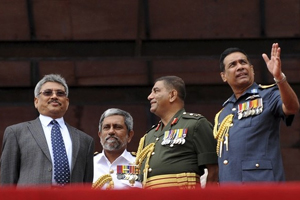
While invitations have been sent out to many High Commissions and Embassies in the country to participate in the opening ceremony of the Hambantota Port, which is one of the events organized to celebrate President Mahinda Rajapaksa's swearing into office for a second time, the Indian High Commissioner or the High Commission has not received an invitation for the event, diplomatic sources said.
The opening ceremony of the Port is being handled by the Presidential Secretariat under the supervision of the Chinese embassy in Colombo.
A senior official from the Sri Lanka Ports Authority said that the name Indian High Commissioner is in the guest list and the delay in sending the invitation is due to a shortcoming of the External Affairs Ministry.
|
Burma awaits release of Suu Kyi
2010-11-12
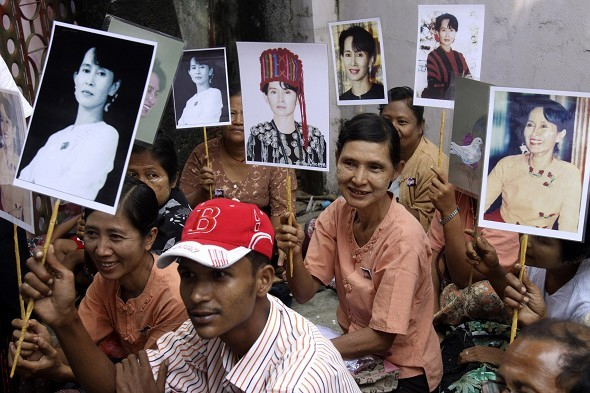
Hundreds of supporters of Burmese pro-democracy leader Aung San Suu Kyi have gathered at the headquarters of her political party in Yangon after one of its leaders revealed an order for her release had been signed by the ruling junta.
About 300 people gathered at the headquarters of the National League for Democracy (NLD) as news of her possible release was made public.
Ms Suu Kyi's house arrest officially ends on Saturday, but rumours have that she might be freed a day earlier have swept the city.
"My sources tell me that the release order has been signed," said Tin Oo, vice chairman of the NLD party. "I hope she will be released."
He did, however, not say when she would be freed or when the order had been signed, but her lawyer, Mr Nyan Win, believes her release is imminent.
He added: "There is no law to hold (Ms Suu Kyi) for another day. Her detention period expires on Saturday and she will be released."
Jailed or under house arrest for more than 15 of the last 21 years, the Nobel Peace Prize laureate has become a symbol for a struggle to rid the south-east Asian country of decades of military rule.
Her current detention began in May 2003 after her motorcade was ambushed in northern Burma by a government-backed mob. The detention period was extended in August this year when a court convicted her of briefly sheltering an American intruder who came to her house uninvited.
If she is released, Ms Suu Kyi, 65, plans to help her disbanded party probe allegations of election fraud, according Mr Nyan Win, who is also a spokesman for the party.
Meanwhile, state media announced on Thursday that the military-backed Union Solidarity and Development Party had secured a majority in both houses of parliament.
- news.aol.co.uk
|
King’s future at stake!: SLFP MP’s disenchanted -two groups emerge ‘love’ and ‘hate’
(Lanka-e-News, Nov.14, 2010, 12.10PM) There are reports that there are two groups emerging within the Govt. - a group which loves and the other which hates. The seniors of the SLFP Party told Lanka e news, the two groups are, the group with the President and the other which is against the President respectively.
The President in his eagerness to build up the strength of the Govt. is outrunning his sureness of his own party members. By offering important portfolios to those of the SLMC and other parties who joined the Govt. he is sidelining the seniors of the SLFP. Because the SLFP members are being provided with dirt and dross and is giving prominence only to those who came from outside, there is a lot of disillusionment and resentment within the Govt. party. Owing to this the re shuffle which was to take place after the President takes oaths for his second term had to be postponed until the budget debate is over.
SLFP Gen. Secretary and Minister Maithripala Sirisena, Ministers Basil Rajapakse and many front liners have opposed the move of the President to give portfolios to outsiders. The Lanka e news website posted this news on the 9th of Nov. under the caption ‘ Basil- Maithri against President’s action : trouble brews within – re shuffle postponed.’
There are voices of dissent within the party that ‘if outsiders are being given Ministry posts, we should also be given’. The SLFP MPs have started whispering against this in dark corridors. They have begun announcing that after the war victory, even though there were Ministers and MPs propping the High and mighty then, the same respect and regard cannot be shown by them now. If the party’s safety fails to be protected, the political future of the High and mighty may also collapse, they say.
As Basil Rajapakse says efforts are being made to groom the next country’s leader, so there has arisen signs of a conflict between the uncle (Basil) and nephew (Naamal Rajapakse). While Naamal Rajapakse is having close relationship with the new UNP MPs who joined the Govt. and with a selected group of SLFP ers in strengthening his political future, Basil Rajapakse is engaged in a campaign of promoting goodwill and good relationships with the SLFP MPs.His aim is to strengthen the SLFP as a single party, he says.
Meanwhile the President has been informed, based on confidential reports that his voter base is on the decline since the period of the Presidential and general elections. The reports have disclosed that the Govt. might face severe odds at the Provincial council elections on the basis of the views expressed by the people in the electorates.
After the President became aware of this situation, he instructed the Organizers and MPs to go to their electorates and begin party propaganda campaigns immediately. The President at the last Parliamentary group meeting on the 9th had been very stern. Without speaking of the cabinet re shuffle, he has stated,Ministry portfolios cannot be given to every Dick,Tom and Harry. The door is wide open for those who wish to join the Govt. as well as to those who wish to leave the Govt. he has added.
It is learnt that the President has also told that the new MPs cannot expect to get Ministry, Deputy Ministry portfolios at this juncture. After this announcement, there had been a great amount of displeasure and opposition within the Govt. ranks, sources say.
Meanwhile, those SLFP Organizers, MPs of the SLFP who did not get Ministry and Deputy Minister posts are to be given Prados, Monteros,Vans, Jeeps etc. to inspire them to go to their electorates and canvass support for the Govt. The President has given this directive, it is reported. The vehicles are to be provided at State expense, of course
|
Thug attack on JVP MP Handunneththi In Jaffna
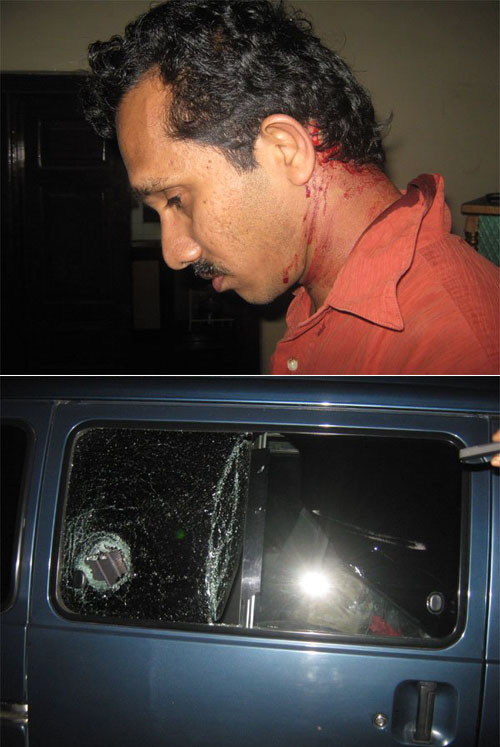
(Lanka-e-News 14.Nov.2010 10.00PM) JVP Parliamentarian Sunil Handunneththi and a group of people have been attacked in Jaffna town today evening by a group of Sinhala speaking people who appear to be from security forces. Mr. Handunneththi has received an injury on his head due to the attack. The attack had taken place at the residence of former Parliamentarian Padmini Vidambaranathan in Jaffna town.
Mr. Handunneththi had reached Jaffna today evening to participate at a campaign organized by the ‘People’s Movement for Democracy’ to be held tomorrow to get signatures to a banner demanding the government to reveal the names of those who are detained. Mr. Handunneththi had visited the residence of former Parliamentarian Padmini Vidambaranathan to discuss the current political situation in Jaffna. Several people’s representatives in Jaffna including the husband of the former Parliamentarian had participated at the discussion.
As soon as the discussion commenced the group of goons had broken into the place and had attempted to abduct JVP candidate for Jaffna District for the general election Lalith Kumar. When Mr. Handunneththi objected to this act the goons had attacked him. In the attack journalist Priyanthe Liyanage, who had been there to report the discussion and Lalith Kumar too received injuries on their heads. The vehicle travelled by Mr. Handunneththi too had been badly damaged by the goons. A complaint regarding the incident has been lodged at Jaffna police. Courtesy of "Lankatruth"
|
Why Casino bill was passed in unholy haste exposed : Lanka’s ‘Vaas jhunjhun’ to beat ‘Las Vegas’
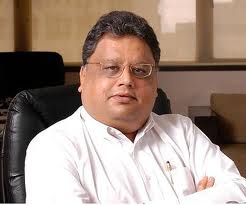
(Lanka-e-News, 12. Nov.2010, 22.20PM) Why Sri janaranjana Percy Mahendra Rajapakse Govt. passed methodically the special gambling (soodhu) bill in Parliament and made soodhu a victor over the nation the vanquished has now been exposed.
No matter what yarns the Govt.’s soodhu lovers may spin to defend their obnoxious actions which are placing the younger generation specially and the nation as a whole generally in dire jeopardy from the standpoint of Buddhist culture and society, the magnate behind this is an Indian Billionaire businessman by the name Rakesh Jhunjhunwala.
On the same day as the Govt . notified in the gazette of the special soodhu draft bill , that is on last 4th October , the chief Financial officer Hadhik Dhebar of the Co. ‘Casino operator Delta’ which belongs to Jhunjhunwala said, his Company is hoping to commence a casino business in Sri Lanka (SL) within the next 6 months.
The casino operators in India are Seekim, Dhaman and Ghowa. This Casino Co. Delta is expecting to spread to SL , and is to invest US dollars 225 million within three years in the businesses in the region. The Company is targeting the foreign tourists to SL after the war , he added.
This billionaire businessman Jhunjhunwala ‘s assets run to the tune of Rs. 1.15 billion dollars , and he is India’s 57th wealthiest man.
Junjunwala’s Delta Co. also has an air craft charter service . A Sri Lankan politician , a new
M P associated with aviation , according to reports, is maintaining very close and cordial relations with Jhunjhunwala . This politico is also a very close friend of President Percy Mahendra , and he had been accompanying the latter on all his foreign tours lately.
An opposition politico expressing his views on this jhunjhunwala – junket wala combination said , in Thailand ,even the Army junta is forbidden by law to run casinos . But the SL ‘junta’ has gone beyond and without any scrutiny or precautions is preparing to popularize the casinos and make them thrive only with the objective to help its politicians to make money at any cost. By this SL instead of becoming a Las vegas will turn into ‘Vaas jhunjhun’ , he noted.
In this picture is Jhunjhunwala. |
Soodhu Chinthana’s lover for casino: reveal the boss of ‘Free group’ – ‘Junket’ -Mangala
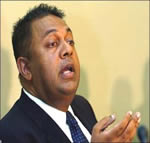
(Lanka-e-News, Nov.12, 2010, 12.40PM) UNP M P Mangala Samaraweera addressing a media conference at the UNP media unit yesterday (11) said, the President Mahinda Rajapakse who obtained a mandate to rule after promising that his country will be made to steer clear of gambling and liquor, is now swearing in as the President for the second term after completing five years,while creating a gambling kingdom in Sri Lanka.
The President passed this draft bill on the soodhuwa in Parliament with the stubbornness of a mule without paying heed to the requests against it of the religious dignitaries of all religions, Buddhist, catholic, Hindu and Muslim. The wrath of the Gods against this was demonstrated a day ago by the heavy showers and thunderstorms that descended on Colombo which was devastated by the floods, he added.
The Prime Minister D M Jayaratne promised the representatives of the opposition and the maha sangha Theros at the Nalandarama Temple when he met them that this draft bill will not be presented, yet the Govt. got the soodhu bill passed. It is clear from this that there is a force more powerful than even the religious dignitaries in the country who can exert influence over the Govt. he pointed out.
The Soodhu bills were passed in various ways and colors in the Parliament to serve the gambling den mudalalis in this country. Even before this bill was passed several websites had posted reports that a casino business is going to be inaugurated in SL in November. They also published that an Establishment under the name ‘Free group casino’ is going to have casino business 24 hours a day, and dollars, Euros and rupees will be accepted there. The Deputy Foreign Minister ‘s announcement in Parliament that these are to be opened only in special zones for foreigners is an absolute lie, Samaraweera observed.
The Free group Co. is being introduced to SL for casino operations by ‘Junket’ establishment. What this establishment does is, by providing all the comforts to the gambling addicts, they take them from country to country after giving cash. Amidst these facilities, they are also introduced to international prostitution. The Govt. is openly embracing the world mafia Organizations and the underworld. Based on this SL is going to be a casino headquarter for the world, which will lead to all the evils including drug trafficking. The Rajapakse Govt. in its eagerness for earning an income is fast heading the country into an international hellhole, he said with concern.
Who is getting down this Free group to SL ? This new culture is being introduced to SL by the Parliamentary MPs or is there a greater force manipulating these evils. ? he asked from the Govt.
When we questioned this in Parliament, the Deputy Minister Sarath Amunugama kept silent glued to his seat, but it was MP Sachchin Vaas Gunawardena who got cold feet. It is the duty of the President to reveal to the country as to who is the main person behind this casino promotion and projects, Samaraweera further questioned.
|
Jaffna library temporarily closed because of the violent uproar created by Presidential Secretariat Sinhalese who went there -Book racks broken , books thrown ,ladies harassed-
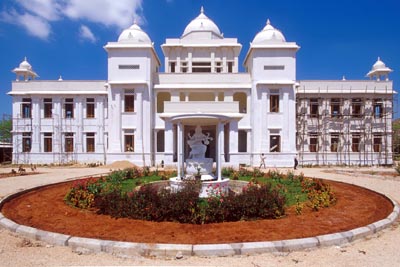
(Lanka-e-News, Oct.31, 2010, 12.50PM) Permission to enter the Jaffna Library for visitors had been temporarily suspended from the 30th. This decision had been taken specially because a group of Sinhala visitors from the South had forcibly entered the Library and turned violent breaking the shelves and throwing away the books.
During the elections and development, it was a group of Sinhalese from the south who set fire to the Jaffna library and created a black mark for the country.
Former Jaffna district M P M K Sivajilingam speaking to Lanka e news said, on the 23rd the Govt. doctors association jointly with the Jaffna doctors Association has had a conference at the Jaffna library auditorium. Owing to this conference the visitors were precluded from entering the Library from 9.00 a.m. to 6.00 p.m. on the days of the conference, and a notice in all three languages had been fixed near the entrance door. The Doctors Association had paid the necessary fees duly and reserved the auditorium for holding the conference and Police security too was detailed at the premises.
Last 23rd, a group from the South who had gone on a Jaffna tour in 36 buses have asked permission to enter the Jaffna library. The officers of the Library had told them as there is a conference going on no visitors are allowed inside. Moreover they have pointed out at the notice to that effect displayed. At about 3.00 p.m,. the visitors have tried to enter the library by force. They have told that they are from the Presidential office and forced themselves into the Library. They have then run amok breaking down the shelves and throwing away some of the books. They have also harassed the ladies working in the Library, according to Sivajilingam.
The statue of the senior respected political leader of the Tamils and a former leader of the Federal Party S J V Chelvanayagam is situated near the Library. The group had broken down the trees and plants near this statue and strewn them about before going, Sivajilingam further added.
Now, army had been deployed around the Library and visitors to the library had been barred on an order received from Colombo.
Meanwhile EPDP leader and Minister Douglas Devananda at a meeting held at the Jaffna library premises on the 29th has tendered an apology on behalf of the Govt. over the incident.
|
Religious leaders to request President to free Gen. Fonseka on the day he is taking oaths for his second official term
(Lanka-e-News 11.Nov.2010 11.15AM) Leaders of all religious sects are to sign and address a letter to the President requesting him to free General Fonseka on the occasion of the swearing in ceremony of the President for his second term in office.
This letter is to be handed over to the President prior to his taking oaths for his second official term scheduled for the 19th of November.
Anoma Fonseka who met the chief incumbents of the Malwatte and Asgiriya chapters on the 9th at Kandy has had discussions with them regarding the letter that is to be forwarded to the President signed by all religious dignitaries. In addition, Anoma Fonseka is due to meet the religious leaders of the Catholic, Hindu and Muslim communities to inform them about this.
|
Basil and Maithri against Mahinda’s actions; trouble brews within –reshuffle postponed
(Lanka-e-News, 09.Nov.2010, 10.40PM) According to reports reaching Lanka e news, the Cabinet re shuffle which was scheduled to take place after the President takes oaths for his second term has been postponed owing to rifts and disputes which have erupted within the party.
It is learnt that Ministers Maithripala Sirisena and Basil Rajapakse have expressed resentment against the proposed Ministerial appointments to those who have joined the Govt. from other parties.
When the ratio of the Cabinet posts are taken into account, a large number of Ministerial appointments are being granted to the UNP and the SLMC MPs who joined the Govt. In the circumstances, SLFP seniors and MPs are disillusioned over it. Besides, the SLFP seniors getting marginalized as a result had led to grave despair and disappointment among the SLFP membership, reports say.
|
Sri Lanka prez calls off Britain trip fearing arrest : The Times of India
(Lanka-e-News, Nov05, 2010, 5.5PM)
In an embarrassing turn of events, Sri Lankan president Mahinda Rajapakse has been forced to cancel his proposed visit to Britain following fears that he might be arrested for alleged war crimes under British law. Rajapakse's provisional engagements included an address to the Oxford Union, and it's learnt that certain Sri Lankan Tamil organisations were planning to move court for his arrest.
Asked to comment on the cancellation, the British foreign office said, "The president's plans have changed." Several phone calls to the Sri Lankan high commission fetched only silence.
Under the principle of universal jurisdiction, war crimes and crimes against humanity can be prosecuted in Britain even if they were not committed in the UK. The Global Tamil Forum has been at the forefront of the anti-Rajapakse campaign here.
In October 1998, Scotland Yard had arrested former Chilean dictator Augusto Pinochet in London for atrocities against Spanish citizens during his 17-year rule. Rajapakse's cancellation of his tour could well send out a message to Gujarat CM Narendra Modi, who has been targeted by human rights groups for allegedly violating religious freedom, a ground on which the US had denied him visa in August 2008. The revocation was slammed by New Delhi as "lacking in courtesy". Modi has been to UK post-Gujarat riots, in August 2003, but the British home office was criticised for allowing him visa.
Recently, human rights activists here obtained warrants to detain Israel's foreign, defence and intelligence ministers if they stepped on UK soil. Hearing this, they either abandoned their trip or landed at the city's Heathrow airport, but took the next flight back.
Sri Lankan foreign minister G L Peiris was despatched to reconnoitre last month. He was met with protests outside the International Institute of Strategic Studies, where he delivered a lecture. Tamil demonstrators displayed pictures of torture on LTTE cadres by the Sri Lankan army. Peiris claimed the photos were doctored.
When Peiris called on his British counterpart, William Hague, the Sri Lankan government was asked to carry out a credible and independent investigation into reported war crimes during its extended civil war with Tamil separatists, which ended last year. He was also advised that the Rajapakse government must demonstrate its unconditional commitment to democracy, human rights and media freedom.
Besides, the British foreign office is unhappy about what a source said was the controversial background of Prasanna Silva, a Sri Lankan army officer who is now the defence attache at the Sri Lankan high commission here. (The Times of India )
|
Intelligence units have received information that a political party and University students are heading for an armed campaign -Keheliya
(Lanka-e-News, Nov04, 2010, 10.50PM) Minister for media and information, Keheliya Rambukwella when intimating the cabinet decisions at the media briefing held at the Govt. information auditorium today (4), answering a question posed by journalist said, every citizen in this country has a right to live anywhere he chooses to live. There are no separate areas for different groups of people. Our Govt. does not allow room for that.. If the Rev. Cardinal Ranjith goes to the North and sees, he will then know what amount of work the Govt. is doing. The Govt. is aware as to what these people who are talking of the colonization in the north are aiming at. We also respect the right of Cardinal Malcolm Ranjith too to express his views, he added.
There is a population of 20 million people in a square meter area of 64000. All these people have the same rights in this country, Rambukwella pointed out.
A journalist questioned on the statement of Rev. Cardinal Malcolm Ranjith before the lessons learnt and reconciliation Commission that because the Govt. is engaged in the colonization in the North grave dangers are envisaged in the future and even though 1 ½ years have elapsed after the war ended, the Govt. has not taken any measures to resolve the Tamil people’s issues.
Rambukwella said, the colonization scheme of late D S Senanayake introduced in 1947 under the farmers settlement program was a correct concept. If any part of the country there is bare land, the Govt. has a right to settle people in those lands.
Q by a journalist
The farmers colonization scheme introduced by D S Senanayake, was one of the main reasons for the escalation of the ethnic problem ?
A
That did not contribute to the ethnic problem. That is your personal opinion. There are no areas in our country demarcated as belonging to a particular group, the Minister replied.
The following were the questions posed by the media and the answers given by the Minister
Q
Is there any truth in the story that a Minister has requested the President to ban a students union on the ground that they are in league with a political party and are preparing for an armed campaign?
A
Yes. The Govt. intelligence units have received information that there are moves for such an armed campaign. The Govt. is keeping a vigilance over this.
Q
The unions say that the Govt. by making false charges is attacking the unions with a view to destroying it. Is this true ?
A
Our country is not in need of students who are assaulting Vice Chancellors with clubs and poles. Our country only needs well behaved well mannered students. If the students are disobeying the laws, there isn’t a separate system of laws for the students. The laws of the country apply to all.
Q
Is there any truth in the story that the Govt. is bringing new laws -‘soodhu enactment’ in relation to Soodhuwa, and name certain areas as gambling zones.?
A
Yes. It is not a gambling enactment. But we will be naming such zones. This is not peculiar only to our country. All countries known for their successful tourism industry have such zones. Even Muslim countries have them. The Govt. proposes to open these zones in areas where tourism is booming.
|
General’s life at stake: unidentified earrings wearing group try to approach him
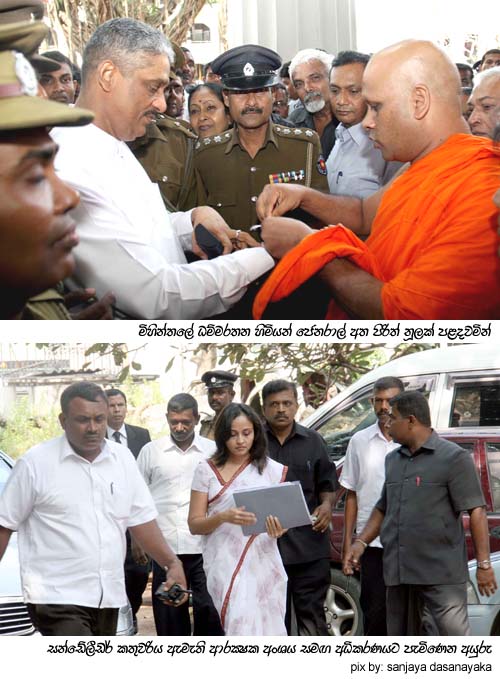
(Lanka-e-News, Nov.05, 2010, 2.50PM) When Gen. Fonseka the former Army commander was being brought to the Colombo High court complex and when he was taken back after the case escorted by the Prisons officers, in connection with the ‘white flag’ case trial, a group of unidentified youths in civil clothes have tried to get close to him.The supporters of Gen. Fonseka had criticized the police around for being not adequately watchful.
The police had also not taken any action to evict the youths from the place even when an argument arose between them and the media over the obstruction by these youths against photos of Fonseka being taken. When the General was being taken towards the prisons van after the case was over, these youths had tried to creep closer to Fonseka. The supporters of Fonseka had objected to this when these youths have at once dispersed and disappeared from the court premises.
DNA MP Arjuna Ranatunge who made a special announcement to the media at this juncture said ‘ we have noticed that unidentified unnecessary individuals surround him when he is being brought to courts. They obstruct the media. Even though we are MPs, we are also allowed to go close to the General only after being checked. But the police allows earrings, Tee shirt and denim wearing unidentified individuals to get close to him without any checks.
These unidentified youths obstruct the cameras when they were focused on the General to take pictures. When a dispute arose between these youths and the media the police took no action against these youths.
There are reports that there are plots to assassinate the General. Therefore there is a special responsibility on the police to investigate this. But when we show them, the police higher ups tell them to go away. If any harm befalls the General the Govt. and all the officers here must hold themselves responsible, Arjuna emphasized.
The chief incumbent of the Mihintale Rajamaha Vihara Ven. Walawewiddhawewe Dhammaratne Thero……
It was the General as Army Commander who saved the country from the clutches of the terrorists. We do not know what time he will be assassinated. Yet this place is filled with CID officers from morning. Even when we just get close to the General we are being blamed.We are being jailed. Otherwise we are killed. This is the attitude of this Govt. We noticed that when the General was being taken to and from Courts this unidentified group getting close to the General. They can stab him. They can shoot him with a pistol. We cannot forget the fact that,like he has threats from the LTTE he has threats from others in this land.
We have nobody to tell this. Divine power should protect him. Stop this harassment inflicted on him. Restore good governance and respect the laws.. The deities of all religions will then bless you,the Ven Thero urged.
The main witness in the white flag case, Fredrica Janz was brought to High court on the 4th with special Ministerial security protection. 5 Security officials of the Ministry and a back up vehicle had been provided as security to her by the Defense Ministry.
|
Police set fire to Muslim village and chase away 54 families: Governor’s (Brigadier) order
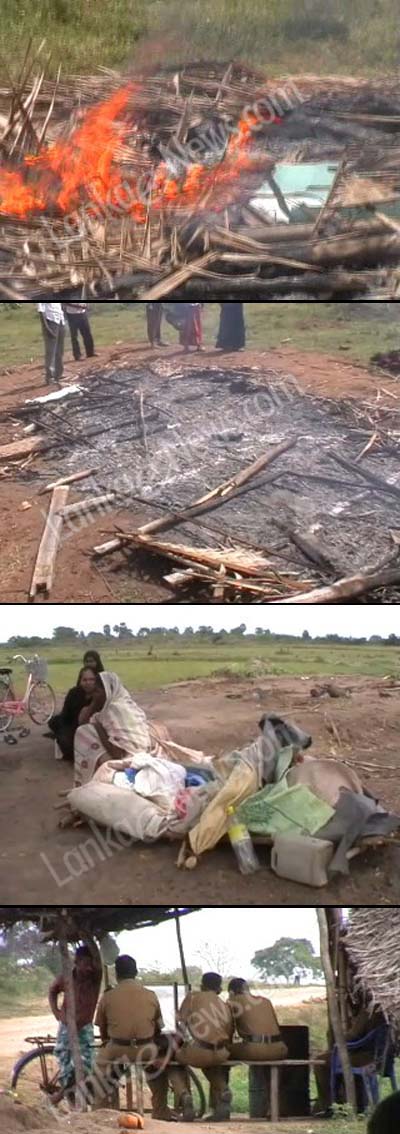
(Lanka-e-News, Nov04, 2010, 11.10PM) Last 31st Sunday, a group of policemen have arrived at dawn and set fire to a Muslim village Kandalkadu and a Muslim mosque in the Kinniya District and chased away 54 families who were resident there.
The victims say that the police has told them that this suffering was inflicted on the poor villagers by the Governor of the East Brigadier Mohan Jayawickrema.
These unfortunate Muslims are long time residents of Kandalkadu village, and they have registered deeds which they received in 1933 and 1945.There are over 130 families who were displaced due to the war resident in this village and had taken up residence in Kandalkadu. They have gone to their homes after the Trincomalee District Secretary had given written permission to them to stay.
Though these victims have shown their deeds and the letter given to them by the District Secretariat, the police have not heeded any of their pleas. The police had said they have no right to be in those places and questioned how they came into those jungles. After saying that they should obey what they say, the Police have set fire to the houses.
The mosque that was also set fire by the police had been built in 1972, the Kandalkadu residents say. These victims are refugees in the Kinniya Al adhan Vidyalaya.
The Governor, Brigadier Jayawickrema Mohan had arranged for a meeting with these Muslim victims yesterday, he has later postponed it.
A report had been asked from the Kinniya Grama niladhariya. The Grama nildhariya has reported that the victims are resident for a long time ; they have the janasaviya and samurdhi reliefs ; and they are registered even in the electoral registers.
When Lanka e news tried to contact the Governor over the phone regarding this issue, a person answering the call told,Jayawickrema has not come to office today.
When Ranjith Silva’s office was contacted, an officer answering said, the District Secretary had gone to the Kinniya District Secretariat.
The pictures depict the raging fire engulfing the houses; a house that has been completely burnt down; a family which is rendered destitute after the fire waiting with their remaining implements and wares; and the police guarding the place burnt down preventing anybody from entering the area.
|
Presidential elections not free and fair: elections monitoring Organizations say -dismissal of election petition by Court notwithstanding
(Lanka-e-News, Nov.03, 2010, 10.30PM) The Supreme court (SC) recently dismissed without a trial the election petition filed by the Opposition common candidate Gen. Sarath Fonseka against the election of Mahinda Rajapakse as the President on the ground that the elections were corrupt and abounding with malpractices. The petitioner requested the court to make an order abrogating the election of Mahinda Rajapakse and appoint the petitioner as the legitimately elected President.
Though the SC dismissed the petition, a majority of the election monitoring Organizations have declared in their reports that the last Presidential elections was corrupt and replete with malpractices and frauds.
Lanka e news inquired from the monitoring agencies as to what they have to say now, in regard to the SC decision vis a vis the adverse reports of the monitoring Organizations regarding the last Presidential elections 2010.
-Ranjith Keerthi Tennekoon (CAFFE Organization)-
The SC rejected this petition because of a technical flaw in the petition. This petition had not been presented duly taking into consideration all aspects of it.
Under the Sri Lanka election laws, an election petition can only be filed by the individual who had suffered loss consequent upon the election malpractices. As monitoring Organizations abiding by the laws we have still not acknowledged the elections as legally acceptable. But we exist only on the sympathy of the elections Commissioner. Though repeated requests were made to put things right, those who were in charge of the conduct of elections did have not allow it to suit their purpose and for their benefit. Hence, the elections monitors could during the elections only carry out their monitoring and show to the people the reports they have prepared. During the elections, the monitors attended meetings of party leaders only at the mercy of the Elections Commissioner.
The 2010 Presidential elections was rampant with corruption, malpractices and frauds. The Court had rejected the petition against the election results based on the grounds cited in it. This petition had been filed without due regard to the legal requirements besetting such a petition. But we are of course standing by our monitoring reports.
-Rohana Hettirachchi (PAFFREL)-
The SC dismissed the petition on a legal flaw in the petition. We are not entitled to talk on that. Yet, we did not see anything fair or free in the 2010 Presidential elections. But we cannot for sure say, based on our monitoring about the pressures which were exerted to rig the election results.
Specially illegal use of State assets, unlawful propaganda, use of State media wrongfully were serious offences. Even on the day of elections it was announced that Gen. Fonseka did not have a vote. Transfers of Police officers during the election period have all had an impact on the results. But the extent of its impact cannot be said for certain.
-Senior lecturer Uditha Gayan Gunasekera ( Human rights Scholar)-
Though at the Presidential elections, some of our allegations based on our monitoring could not be borne out, we cannot say the elections was free and fair.
If the election petition has been dismissed based on a technical flaw, it is those who presented the petition to Court who should hold themselves responsible. In other words, without proper attention to the details and legal requirements attaching to it, the petition had been filed.
|
Hand tractors of ICRC distributed among Namal's favourites
2010-10-26
It is reported that some two-wheel tractors which the International Committee of the Red Cross (ICRC) expected to distribute in Mullaittivu and Vavunia Districts were allegedly distributed among people of his choice by MP Namal Rajapakse who attended the ceremony with a group of UPFA members, overruling the list of beneficiaries prepared by the ICRC.
The ceremony had been organized by Ms Maryse Limonar, head of the International Committee of the Red Cross (ICRC) in Vavuniya to distribute 400 hand tractors among the villagers in Mullattivu and Vavuniya Districts. A list of beneficiaries also had been prepared by the ICRC.
However amidst the resistance of the ICRC representatives, a group of MPs including Messrs Namal Rajapaksa, Manusha Nanayakkara, Saranatha Basnayake and Sri Ranga had distributed the tractors of their choice by force. Consequently Ms Maryse Limonar had walked to the rear of an ICRC vehicle and cried who couldn't hide her feelings.
Courtesy - LankaTruth
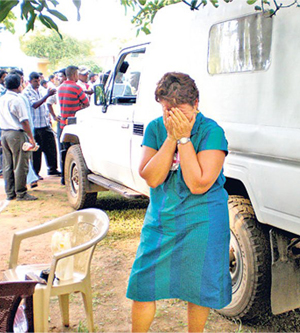
|
Is country in an irretrievable economic mess ? –Central Bank says it cannot guarantee the safety of people’s deposits in the State approved banks
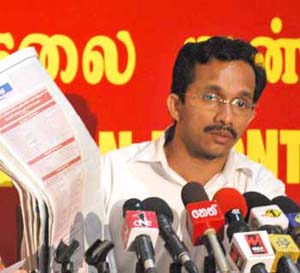
(Lanka-e-News, Oct.24, 2010, 11.25PM) The JVP M P Sunil Handunetti addressing a media briefing at its main office today (24) questioned as to why the weekend newspapers today (24) carried Central Bank notices that it will not be responsible for the monies deposited by the people in the State Banks, Commercial banks and other banks which are operating with the Central Bank approval. The Central Bank has added that it cannot guarantee the security for these Deposits in the Banks as well as in the duly registered financial Institutions. Is this notice being made because the country is in a dire economic quagmire ? he asked.
Handunetti stated that the Govt. must clarify this immediately. to the people.
The confidence of the depositors can only be built if adequate protection is assured to their deposits. By this notice, the Central Bank is impliedly telling the people not to deposit monies in the Banks which have been duly approved by it, he pointed out.
All Govt. transactions are being conducted via the National savings Bank. While that is so, if the Govt. says it will not guarantee the safety of the people’s deposits in the Banks, then who is going to be responsible ? he asked.
If the Govt. notifies not to deposit monies with Sakvithi and other Mudalalis who are fraudsters, it is understandable. When the public deal with them, the people have to exercise caution. But, when the Central Bank of the State says,be careful when depositing monies in its own state Banks, Bank of Ceylon, People s bank, National savings Bank etc. this is a big issue the people will have to address themselves to. Is the Govt. giving a forewarning about the dire economic mess in the country and the Banks? he questioned.
The Govt. boasts that the share markets are booming, but within half an hour they are crashing. The Govt. suppresses this. At another time it says, the personal incomes have grown, but when it is exposed that it is not and the country is a middle class economy, the Govt. does a U turn, and warns depositors to be careful about their deposits in its own Banks. In the circumstances, it is imperative that the Govt. makes its stand very clear to the people without playing ducks and drakes with their monies and toying with their future.
Isn’t the Govt. aware that the Central bank of a country is the Chief coordinating State Bank. If that Bank is warning the people not to trust the State banks or other Banks, certainly it is confirming there is a gigantic economic problem in the country, Handunetti noted.
The Govt. says after the war was over it is engaging its whole time in development. Then where are the benefits of the development which should be passed to the investors, the businessmen, the depositors and the people in general. But, when the Govt. is making negative announcements in the midst of its brags and boasts, there is definitely something seriously ailing with the Govt.’s economic policies. The Govt. and its policies cannot be depended upon has been proved by the Govt.’s actions, announcements and backstreet politics. The sum total of all this is the Govt. has no economic or development plans or programs, he pinpointed.
President defends Central Bank’s warning disclaiming responsibility
(Lanka-e-News, Oct. 26, 2010, 10.45AM) The President who is the Head of the State and Minister of finance had warned customers that they ought to know which Bank they should choose to deposit their monies.
The President gave this answer to the questions raised by Gampaha District MP John Amaratunge and Ratnapura district M P Ranjan Ramanayake at the advisory administrative Committee meeting of the Finance Ministry in Parliament yesterday following the Central Bank notice which appeared in the weekend newspapers that it will not hold itself responsible for the people ‘s deposits in the Banks and Financial Institutions duly approved by the Central Bank.
Ramanayake had then asked the President, in that case who will be responsible to the Depositors of the State Banks if they go bankrupt. The President has replied that the Govt. cannot be answerable to every responsibility.
On the 24th, the Central Bank of SL had published a public notice via the media that it has authorized 22 Institutions for receiving deposits of the public; 9 special Banks with licenses and 36 registered Financial Institutions. Representatives appointed by the Central Bank monitor the activities of the Banks, the notice added.
Yet, in the Central Bank notice what was emphasized as important for the public to note was it cannot hold responsibility for the funds of the depositors in any Institution, and the Depositors have to exercise caution when making deposits. The Central bank had refused to guarantee the safety of their deposits.
|
|
The President who benefited from the justice of the courts four times must allow others also to have access to such justice -former CJ
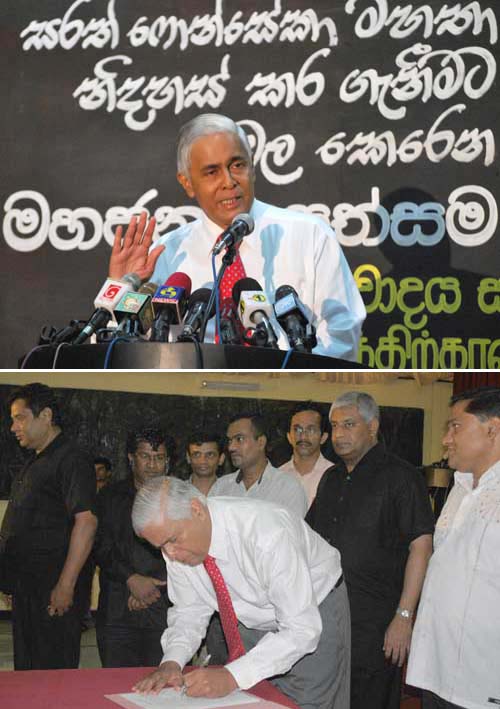
(Lanka-e-News, Oct. 26, 2010, 10.50AM)
The former Chief justice (CJ)Sarath N Silva speaking on the occasion when he arrived at the signing of petition demanding the release of former Army Commander Gen. Sarath Fonseka at the Jayawardena center Colombo on the 25th said, the present President Mahinda Rajapakse to whom the courts had dispensed justice four times should allow others too to secure justice via the Courts.
Silva the former CJ said, by appointing military courts, filing charges, approving charges and ratifying verdicts, the President prepared the ground for the jailing of Fonseka. The chief of the commanding forces Mahinda Rajapakse is the President, Gotabaya Rajapakse , his brother is in charge of the Army operations while Chaamal Rajapakse the other brother of the President who is the speaker made sure that Fonseka ‘s parliamentary post is terminated. In other words, it is the brothers company which has orchestrated this whole jailing operation.This is why, it is all the more important that justice shall prevail in the case of Genera Fonseka, he emphasized.
The former Army Commander engaged in the war against certain sections of the Tamils of the North. Yet when he contested election s, majority of the Tamils, not only the northern even others across the country voted for him. The Tamils therefore regarded him as one who had won their confidence and love. He is therefore a genuine and dependable leader.
But this war hero who won the war for the whole country’s benefit was, in less than 8 months after the war ended abducted and jailed depriving him of all his fundamental rights. Fonseka was denied even the basic rights a most bestial criminal is entitled to. This was a gross violation of all the laws of the country. Even the rights what an ordinary citizen in this country is vested with under the constitution was not allowed to be exercised by Fonseka despite the fact that he was a true patriot who sacrificed his whole life while in the Army to defeat the deadliest terrorists, the former CJ pinpointed.
There are two reasons laid down in our constitution when an Army officer’s fundamental rights are lost upon his arrest.One is, if there is any service to be secured from him in war operations or if there is his need to maintain discipline in the Army. In such cases, his rights can be circumscribed. But, because Fonseka was a retired officer none of these grounds apply to him, and hence none can subordinate him. He is a civilian, the former CJ asserted.
The duties he performed were not just two penny half penny tasks. Yet, because of the disdainful treatment meted out to him, the whole world is looking down on us with contempt and ridicule, he added.
We are painting the picture to the world that it is only we who are following Buddha dhamma to the letter. But, I am ashamed to tell that it is in our country that the virtues and qualities of compassion, mercy and tolerance preached and followed by Lord Buddha are most disrespected.
I don’t say Fonseka should not be punished no matter what serious crime he has committed. Of course there are three charges against Fonseka in the military courts. But none of those charges is against him for causing loss or damage financially to anyone or to the Govt.
When he was in the tender Board he had acted bona fides and most honorably. The only charge against him was his not disclosing the relationship his son in law had with a Company in British Borneo. But, the punishment given to him was for dishonorable conduct assuming that the father in law should know of all what his son in law does. This is not a charge that can be leveled in this civilized world.
This why we urge the Rajapakses to do justice to Fonseka on humane grounds.
President is an individual who had always benefited from the justice dispensed by the courts. But for such justice from which he gained, he would not be in the position he is now in irrespective of the enormous services he claims he had done.
In 1980, at the Kalawana By elections petition , the Left party candidate Sarath Muthetuwegama whom Mahinda supported lost his parliamentary seat. Similarly his representative Mahinda Rajapakse who supported him also lost his civic rights. The charges were assassinating the character of the opposition candidate by false allegations. Mahinda Rajapkse challenged this decision in the Supreme (SC) Court. The two judge panel of the SC reversed the low court decision. This was the first of the court decisions which dispensed justice in favor of the President.
Thereafter, in the 1982 Belliatta by election, Mahinda was charged for murdering three persons in broad daylight by shooting. He was remanded with eye witnesss giving evidence. Later, the courts freed him because the evidence of the witnesses were contradictory. If the courts had decided otherwise , he would have been hanged.
In 2005, there was another case against him for defrauding the Tsunami funds collected under ‘Helping Hambantota’ Tsunami relief. At that juncture, in order to save him from arrest, the SC including myself moved to do justice to him. If the President has not received the benefit of the justice of the courts, he would not be the President of this country today.
This is precisely why we urge the President to grant the benefit of the justice of the courts to others too reminding himself of all his criminal involvements from which he was able to extricate himself because justice prevailed in the country under others.
This is why we ask the Rajapkses to act humanely and do justice to Fonseka, the former CJ Sarath Silva earnestly requested.
|
Payment to Bell Pottinger = Allocation of funds for Jaffna Development by Basil Rajapakse
Posted by Sri Lanka Guardian Breakingnews, feature, news 2:39:00 PM

" Bell Pottinger is one of the three companies and names or financial deal involving the other two are not known, Assuming it will be about the £3 million each like the contract with Bell Pottinger, the cumulative cost can be nine million."
(October 24, Colombo, Sri Lanka Guardian) In the hurriedly held meeting of the Government Agent of Jaffna, attended by the Economic Development Minister Basil Rajapakse three weeks ago, a sum of approximately Rupees 500 million (£2,85 million) was allocated for the development projects presented by the GA. The allocation was not outright. The Minister made immediate allocation for the half the cost and promised to scrape through the budgets of other departments to fund the balance.
It is now claimed the controversial appointment of Bell Pottinger consultancy to facelift the image of Sri Lanka in the western world will be costing the country £3 million (Rupees 525 million), a sum has been allocated for progressive payments for the service delivery.
The government goes with the begging bowl internationally for its development work and the northern development is the theme heavily campaigned at present. How the financially constrained government was able to find £3 million for Bell Pottinger will not be known. Only we can guess, it must be coming from the pot of IMF funds.
Bell Pottinger is one of the three companies and names or financial deal involving the other two are not known, Assuming it will be about the £3 million each like the contract with Bell Pottinger, the cumulative cost can be nine million.
The government has also engaged three other international companies to promote tourism post end of the war with the LTTE. Sums paid to these international consultants too are hidden secret. Whilst the government boast of large tourist arrivals, it has an uphill task to recoup its promotional costs running into millions.
Apart from the agreed cost of the international consultancy work, there is also indirect costs like commission payments to middlemen and ministers and the embassies costs.
|
TOWARDS PROSPERITY LANKAN WAY
450 million spent for IIFA, Bell Pottinger consultancy to facelift the image of Sri Lanka in the western world will be costing the country £3 million (Rupees 525 million),Central Bank says it cannot guarantee the safety of people’s deposits in the State approved banks.
Ayyio Chinthanaya mokada koronowa?
A clean Rs. 450 million down the drain on ‘IIFA’ ceremony!
(Lanka-e-News, Oct.22, 2010, 10.30PM) Economic affairs Minister Basil Rajapakse has revealed that a sum of Rs. 475 million was spent by the Govt. on the Indian International film awards ceremony (IIFA) which was held in Colombo, but the income from it was only Rs. 25 million. In other words, according to him a net loss of Rs. 450 million was incurred.
This data was revealed by Basil in answer to the question asked by UNP M P Ravi Karunanayake in Parliament.
It was also disclosed by the Minister that the estimated income from this ceremony was Rs. 698 million.
|
|
manob@hotmail.com - À francoeurope-srilanka@hotmail.fr
Pilliyan said Minister Karuna behind murder of 600 Sri Lankan Policmen in 1990
Pillayan said to the LLRC that Karuna was responsible for the murder of 600 policemen who surrendered to LTTE in 1990 without firing a single shot .
Would LLRC recommend the President to hold an investigation in to this matter ?
Karuna retaliated that he was not even in Batticalo when it happened. What an excuse? Not long ago but before LTTE leadership was totally annihilated by the Sri Lankan Army he said that he handed over the Policemen to Pottu Amman , never mentioned that he was not in the East or the Policemen did not surrender to him .
Since Pottu Aman is not available for questioning Karuana may escape from justice , but Pillayan may be able to bring witnesses to prove his claim too if allowed .
It was good for the Rajapakse and Co , that LTTE Political head Nadesan got killed fighting to the very end than his speculated initial attempt of surrendering to the SLA carrying a white flag. Otherwise he would have told the entire world when being prosecuted that Mahinda Rajapakse bribed LTTE in the 2005 Presidential election. He would have also testified who killed 600 policemen.
The Irony is that under Mahinda Rajapakse rule , a ruthless Tamil Terrorist can become a politician and a minister . Politicians of the opposition parties pending criminal charges can switch sides and become one of his boot lickers, yet the former Commander of the Sri Lankan Army Gen Sarath Fonseka the war hero who led a successful war against the LTTE Terrorism to the very end , hand picked by the President and his brother the Defense Secretary Gotabhaya Rajapakse had been stripped off of all the medals he received in his entire carrier as a decorated soldier, his rank and also his pension because he contested against Mahinda Rajapakse at the last Presidential election .The first Kangaroo court of Mahinda Rajapakse didn't even bother that defense attorneys need to cross examine the prosecutor's witnesses before giving the verdict. Then again the war Hero Gen Fonseka had been sentenced to rigourous imprisonment for improper procurment of arms to SLA during his tenure without giving the defence attorneys a chance to bring the key witness for the defense by a second Kangaroo court . The Kangaroo court of Mahinda and Goatabhaya couldn't even prove of any misappropriation by General Sarath Fonseka.
If Sinhalese are not so called “Modayas Kavum Kanna Soorayas” ....
01 - Is the Defense Secretary Gotabhaya Rajapakse a law abiding citizen of our country? |
02 - If he is a law abiding citizen of our country , will he investigate in to the criminal act of Minister Karuna of forging a Diplomatic Passport , number D1944260 in the name of “Kokila Dushmantha Gunawardena” whose occupation on the passport was given as Director General of Wildlife Conservation and travelling to UK violating immigration laws of our country. Defense secretary has all the powers to investigate this matter as the Pass Port office and The Department of Immigration, comes under the Ministry of Defence, Public Security, Law and Order of which Gotabaya Rajapakse is Secretary and President Rajapakse the Minister. |
03 - Will defense secretary clear his name from this scandal , as Minister Karuna has admitted in a British court that it was the Defense Secretary who had helped him to get the Diplomatic Pass Port ? This is of National importance since if the defense secretary was involved in forgery of a Diplomatic Passport , the Pass Port Department should not be under him not to mention that he shouldn’t be given any administrative position in the Government sector. |
04 - Does Defense Secretary respect Geneva conventions and International Humanitarian laws which Sri Lanka is a signatory? |
05 - Is the Defense Secretary aware that Sri Lanka is obliged to uphold Geneva Conventions and International Humanitarian laws above the laws of the country being a signatory? |
06 - If so will Defense Secretary explain to the public how he could hang a person for treason who would testify against war crimes? |
07 - By doing so is he defying the Geneva Conventions and International Humanitarian laws? |
08 - How would the Defense Secretary and his Brother the President react if the Supreme Court calls for a recount of last Presidential election supervised by International Monitors. |
09 - Will the defense secretary explain to the public under what provision of the Army act the Former Army commander Rtd. Gen Fonseka was arrested? |
10 - Will there be a commission to find out how and who killed 600 policemen surrendered in 1990 under government orders to LTTE Eastern Leader Col Karuna now a Minister in the Rajapakse cabinet ? |
11 - Will the defense secretary allow an international commission to find the mass graves of those policemen? |
12 - Since the Defense Secretary challenged to show evidence of war crimes , will he allow an international commission to look for evidence in the final battle zone where 300,000 thousand Tamil civilians were trapped ? |
13 - If there were no war crimes ,then could he explain what is there to hide or the reason for objection? |
|
Home News PEOPLE LIKE KARUNA AMMAN SHOULD APOLOGISE FOR MURDER OF 600 POLICEMEN, SAYS PILLAYAN
PEOPLE LIKE KARUNA AMMAN SHOULD APOLOGISE FOR MURDER OF 600 POLICEMEN, SAYS PILLAYAN
DATE_FORMAT_LC2
October 21, 2010: People like Karuna Amman should be asked to tender an apology for the murder of policemen by the LTTE in the 1990s, says the Chief Minister of the Eastern Province, Shivanesathurai Chandrakanthan, also known as Pillayan.
He made the statement, while giving evidence before the Lessons Learnt and Reconciliation Commission, when it convened yet again yesterday.
Pillayan was asked by the Commission whether he would apologise for the murder of 600 policemen by the LTTE in the 1990s, as he was a member of the organisation at the time.
Responding, the chief minister said that he had joined the LTTE on February 4, 1991 and the policemen were captured in 1990s.
“The police were captured in the 1990s. I joined the LTTE on the 4th of February in 1991. I got to know that the area residents had said that police had been surrounded and killed.
“If an apology is to be tendered on behalf of the police, then I think it would be good if people such as Karuna Amman, who were leaders at the time, are asked about it.
“I have seen the things the Army did in the 90s. I saw my neighbour, Seeniththambi, being shot. I also saw burnt bodies strewn along the road. I have even seen bodies that were cut up, floating along the rivers.
“Two of my friends who studied with me were taken away at night. Furthermore, I saw an innocent person near my house being kicked when he was pleading for his life. I also saw someone being shot despite pleading for his life. When I was 15 or 16, even I was slapped by the Army.
“The political leaders who spearheaded this by knowing about it are the ones who should ask for forgiveness,” said Shivanesathurai Chandrakanthan.
October 22, Colombo, Sri Lnaka Guardian) Former LTTE regional leader Karuna Amman alias Minister of the ruling party, Vinayagamoorthy Muralidgaran says in an interview with Sri Lanka Guardian that there is no proper reason to apologize for the mass killings in the 90s where more than 600 policemen who surrendered to the LTTE in Batticaloa were executed.
The former rebel leader pointed out that the incident occurred where he was not in the East and the LTTE intelligence head Pottu Amman and Newton must responsible for this mass killing.
"Actually i was not in the Batticaloa that time, but this unfortunately incident happened. According to my information it was lead by Pottu and Newton," Karuna Amman says.
While Minister Muralidaran pointed out that, he was unaware of the comment made by Pilliyan who is currently Chief Minister under the ruling Government. He was however, one of the military tailor in the LTTE under Karuna Amman.
http://www.alertnet.org/thenews/newsdesk/HRW/4b19473a27f17365489f69c44cfea65a.htm
UK: Missed Chance to Charge Sri Lankan Rights Abuser
09 May 2008 23:10:05 GMT
Source: Human Rights Watch
Reuters and AlertNet are not responsible for the content of this article or for any external internet sites. The views expressed are the author's alone.
(London, May 9, 2008) The British government's failure to file criminal charges against a former Tamil Tiger leader for grave human rights abuses in Sri Lanka is a tragic missed opportunity to bring a notorious rights abuser to justice, Human Rights Watch said today. In spite of strong efforts by the Metropolitan Police, on May 9 the United Kingdom government announced that the Crown Prosecution Service found there was "insufficient evidence to provide a realistic prospect of conviction for any criminal offences in the UK" against Vinayagamoorthi Muralitharan, known as Colonel Karuna Amman.
"Britain is missing a golden opportunity to show that human rights violators like Karuna will be tried for grave abuses, no matter where they took place," said Brad Adams, Asia director at Human Rights Watch. "If he escapes prosecution, it will be a tragedy both for his many victims and for international justice."
Karuna was the top commander of the Liberation Tigers of Tamil Eelam (LTTE) in eastern Sri Lanka, and the reputed number two in the LTTE hierarchy until he left to form his own armed group in March 2004. Tamil Tiger forces under Karuna's command were directly involved in some of the worst crimes of Sri Lanka's ongoing civil war, including torture, summary execution, and use of children as soldiers. Because his armed group fought against the LTTE in recent years, the Sri Lankan government did not prosecute him.
Immigration authorities in the UK arrested Karuna on November 2, 2007. After a criminal conviction, he served half of a nine-month term for possessing illegal documents. He was transferred on May 9 to immigration custody and now awaits deportation.
The British government has frequently raised concerns about Sri Lanka's deteriorating human rights situation with the government and has long criticized the LTTE for serious human rights abuses.
Tamil Tiger forces under Karuna's command were directly involved in some of the worst crimes of Sri Lanka's ongoing civil war. In June 1990, some 400 to 600 police officers who surrendered to the LTTE were bound, gagged, and beaten. The Tamil Tigers, including forces under Karuna's control, then executed the Sinhalese and Muslims among them. In July 1990, Karuna's forces stopped a convoy of Muslims traveling in Batticaloa district and executed about 75 people, including women and children. In August 1990, Karuna's forces killed more than 200 civilians in two incidents in Batticaloa district.
In 2004, Human Rights Watch investigated the Tamil Tigers' recruitment and use of children as soldiers. Karuna's forces played a prominent role, routinely visiting Tamil homes to tell parents to provide a child for the "movement." The LTTE harassed and threatened families that resisted, and children were abducted from their homes at night or while walking to school.
After Karuna broke away from the Tamil Tigers, his armed group operated with the complicity of the Sri Lankan security forces. The Karuna group, as it was known, engaged in abduction of children for use as soldiers in Sri Lanka's eastern districts, taking boys from their homes, work places, temples, playgrounds, public roads, camps for the internally displaced, and even a wedding. These abuses are documented in the Human Rights Watch report "Complicit in Crime: State Collusion in Abductions and Child Recruitment by the Karuna Group," published in January 2007.
British law permits the prosecution of individuals for serious violations of international law, including torture and war crimes, committed abroad. For example, in 2005, UK courts convicted a former Afghan warlord, Faryadi Sarwar Zardad, for acts of torture and hostage-taking in Afghanistan.
"British prosecutors should look hard again at the evidence presented by the police before they let Karuna leave British soil," Adams said. "If he does leave, the Sri Lankan government should be preparing to prosecute Karuna should he return to Sri Lanka. Its failure to do so would only highlight its complicity in his recent crimes."
|
manob@hotmail.com - À francoeurope-srilanka@hotmail.fr
|
| By Nirmala Kannangara - Sunday Leader 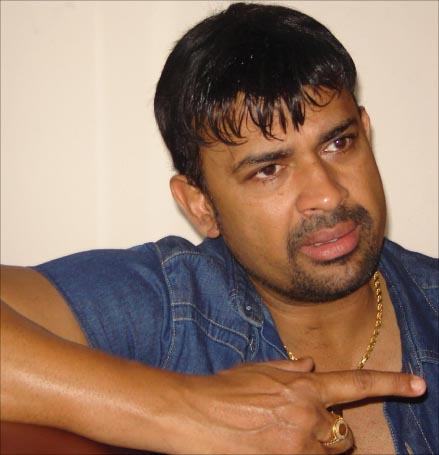
RanjanRamanayake_TheSundayLeader_24.10.10
Actor-turned-politician Ranjan Ramanayake accused the government of masterminding his recent arrest and claimed that he wouldn’t have undergone such a traumatic situation had he supported the government on the controversial 18th Amendment.
Speaking to The Sunday Leader after he was bailed out by the Kandy court, Ramanayake said that he had to serve a jail term for an offense he has not committed, but simply for refusing to support the government on the 18th Amendment.
Ramanayake was arrested on Thursday, October 14 and by Kandy police. According to Police Spokesperson SP Preshantha Jayakody, Ramanayake had taken Rs. 1 million from a female school teacher in Kandy, promising to marry her.
“This is what the genuine opposition politicians or supporters in Sri Lanka would have to face if they do not support the government. This is not new to the world as we have seen countries that had dictatorship regimes and as to how their leaders have treated opponents. For example, take Zimbabwe – the Robert Mugabe regime, Iraq – the Saddam Hussein regime and even in Myanmar none of their leaders’ opponents were able to live peacefully. It is the same thing that is happening in our country. The more you criticize the present regime, the more your life is at risk,” claimed Ramanayake.
According to Ramanayake, he has been arrested by a police team who came in civvies without a court order or a letter from the speaker.
“I was arrested while I was at a discussion with the Deputy Mayor of Sri Jayewardenepura, Kotte, bypassing the normal procedure. The police officers who came to arrest me were in civvies and neither carried an arrest order or a letter from the speaker. Violating all these norms, they arrested me for an offence I have never committed. Even one of my staffers, Upul, who is on the Parliamentary Affairs Ministry payroll, was assaulted by this police team when he requested them to produce my arrest warrant to him,” Ramanayake said.
According to Ramanayake, this female school teacher in question is 42 year old Namal Wijeratne from the Katugastota Rahula Maha Vidyalaya whom, according to him, has been known to him for the past ten years.
“Since 2000 she was one of my fans and has sent me letters, cards, cakes, pillow covers etc. although I knew nothing about her. I knew that she was coming on the wrong track and tried to avoid her many times, but still she kept on calling and sending me letters and gifts. Even once she sent me one of her photographs in a bikini and asked me to comment on her figure. When I ignored her, then she started to comment on my film One Shot and even went beyond, praising my half covered body. Then I knew what her mentality was and ignored her. But she kept on calling me and sending me gifts. Other than this I did not have any other relationship with her, or taken money as she has stated,” Ramanayake said.
Speaking further, Ramanayake queried as to why he would take Rs. 1 million from a woman when he had the opportunity to take Rs. 100 million and many more perks with positions from the government, had he voted for the 18th Amendment in parliament last month.
Accusing the government of pushing the legal authorities to take any possible action against him for not supporting the government on the 18th Amendment, Ramanayake said that he would have been a free man if he supported the 18th Amendment.
“I knew from the beginning that the government was hunting for me because they could not ‘buy’ me for money. From the time I started to contest the Sabaragamuwa Provincial Council Election in 2008, the government was eyeing me and wanted me to support them to which they were willing to reward me handsomely. But since I was not greedy for money or positions, I did not want to betray my policies and the party. I have concrete evidence to prove as to how government big wigs offered to pay me Rs. 100 million, give me a luxury jeep and a house at Kalapura in Mt. Lavinia in order to get my support for them,” Ramanayake said.
According to Ramanayake, he has never been summoned by any legal authority, although he has openly stated that the government tried to bribe him on many occasions and is ready to prove to them as he has all the evidence to establish this.
“All this happened because I did not crossover to the government. Even the day I was arrested, one of the leading SLFP parliamentarians from the Colombo District met me at my lawyer’s residence and wanted me to extend my support to the President, assuring me that legal action of any form would not be taken against me. Notwithstanding, once I was told by a certain leader in the government that the doors of Temple Trees are open for me any time,” he claimed.
He further said that from the time he became the Opposition Leader of the Sabaragamuwa Provincial Council, he has been receiving death threats and although he made several requests to the authorities to provide him a weapon for his safety, it has not been granted.
“Since then I have been receiving death threats. My vehicle came under attack and all this worsened when I campaigned for the former army commander at the January presidential election. It was I who was with Sarath Fonseka when he was released from Cinnamon Lakeside on that fateful day and no sooner my visuals with Fonseka were shown over TV, I was threatened with death,” Ramanayake charged.
Several attempts to contact the complainant, Ms. Namal Wijeratne by The Sunday Leader failed as the Principal of Sri Rahula Maha Vidyalaya Katugastota, E.M. Edirisinghe, refused to call Ms. Wijeratne to the phone.
http://www.thesundayleader.lk/2010/10/24/%E2%80%98one-shot%E2%80%99-fires-at-the-government/
|
|
Traduction tous les langages (français > anglais ou anglais > français etc..) via Google
Translation all languages (French > English or English > French etc. ..) via Google
Quelques fois, il ya des erreurs, soit être précaution // Some times, there are some mistakes, be carfully |
|
|
For The Hot News Click on The Every Chapters Here (Chapitres Ici )
& Read Hot Articles - (In This Page)
|
|
|